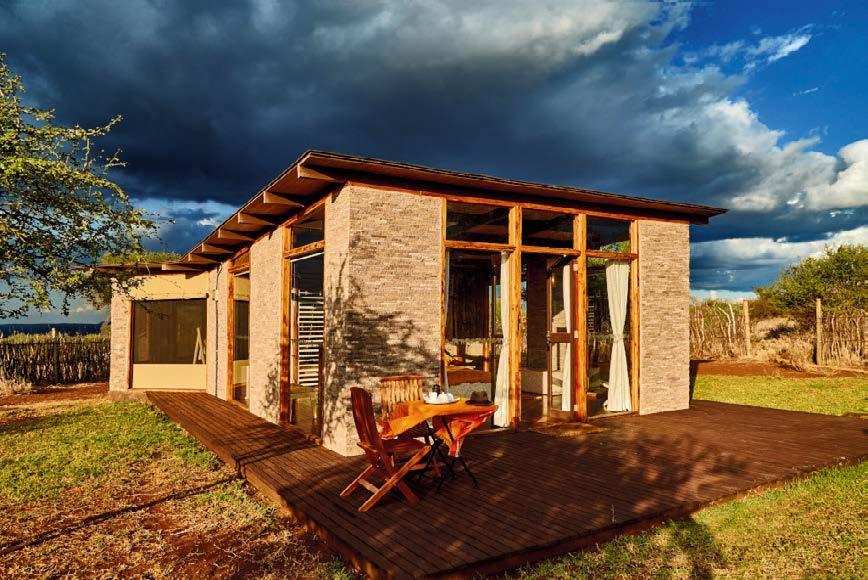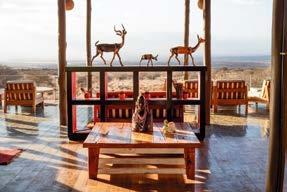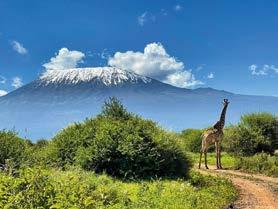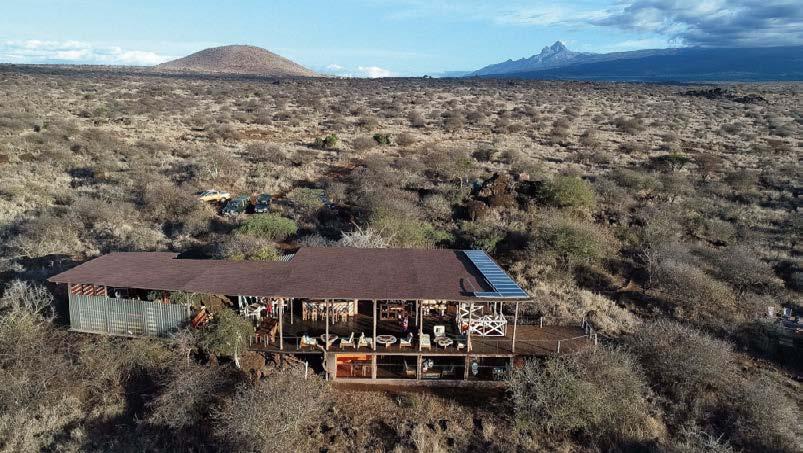






























































































As the high season descends upon us, we are thrilled to soon witness the iconic wildebeest migration thundering across the M aasai Mara. This incredible natural spectacle is a testament to the resilience of the ecosystem and a reminder of the delicate balance we must all work to preserve. The Mara's vast plains and diverse wildlife never cease to amaze, offering a truly unforgettable safari experience.
Beyond Kenya, our regional footprint continues to expand in coordination with our subsidiaries, Aerolink in Uganda, and Regional Air in Tanzania. As a group of airlines, we give our passengers seamless, enjoyable journeys across borders, such as our connection from the Maasai Mara in Kenya to the Serengeti in Tanzania and Bwindi Impenetrable Forest in Uganda.
In preparation for the high season, all three airlines have invested in comprehensive customer service training for customer-facing staff, ensuring that every passenger receives the warmest welcome and exceptional care throughout their travels. Aerolink went a step further, sending their team members on familiarisation trips across their route network. This initiative allowed staff to experience firsthand the passenger journey and gain valuable insights into enhancing every aspect of the travel experience.
The recent floods in the Mara were a poignant reminder of the challenges posed by climate change. Our thoughts are with those who were impacted by the floods, including members of the Maasai community who are an integral part of the Mara's rich cultural heritage. However, I am
delighted to share that the Mara has bounced back with remarkable resilience. While some camps were temporarily affected, the vast majority are fully operational and eager to welcome guests with open arms. The spirit of the Mara remains as vibrant as ever, with its stunning landscapes and abundant wildlife ready to captivate visitors from around the globe.
Against the backdrop of climate change concerns, our marketing team recently participated in a tree-planting initiative at Thogoto Forest. This endeavor aligns with the government's ambitious goal of planting 15 billion trees by 2032 to combat the effects of climate change. By taking proactive steps to protect our planet, we strive to create a greener and more sustainable future for generations to come.
As part of our ongoing strategy to continuously improve our products and services, we are counting down the days to the inaugural flight of our recently acquired Dash 8. This 37-seater pressurised aircraft will enhance our capacity to manage high season demand and give our customers a better flight experience, while passengers arriving back at Wilson Airport will be greeted by a new modern Arrivals Terminal situated within our premises. Improvement of our On Time Performance (OTP) has been a key focus and I am glad to report that initiatives we started putting in place a year ago have paid off with an excellent OTP score of 84% from January to April 2024. We measure our OTP based on flights departing and arriving back at Wilson Airport within an allowance of 15 minutes of the published schedule.

Finally, it is with a mix of pride and nostalgia that I announce my forthcoming transition from Group MD to Technical Director with effect from 1st November 2024. I am incredibly proud of the milestones we have achieved together, and I am filled with optimism for the future of Airkenya. I have full confidence that John Kimondo, our current Group Commercial Director, and incoming Group CEO, will lead this exceptional team to new heights, continuing our legacy of excellence in aviation and unwavering commitment to customer satisfaction.
As you embark on your journey with us, I invite you to immerse yourself in the beauty and wonder of East Africa. Let the breathtaking landscapes, remarkable wildlife and infectious culture ignite your sense of adventure. Rest assured that the dedicated Airkenya team is here to ensure your experience is nothing short of extraordinary, from takeoff to touchdown.
Karibu Kenya! Karibu East Africa!
Captain Dino Bisleti Group Managing Director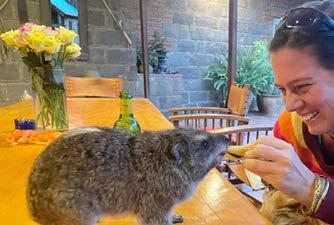
Dear Fellow Adventure Seekers,
It’s already the middle of the year and how time has flown (no pun intended!) The short rains came and went and perhaps we are in for a great migration season across the Mara-Serengeti ecosystem this year. Whatever safari you have booked, whatever is waiting for you as you land; family, friends, a bush breakfast or even a surprise party to celebrate some aspect of life, Ndege News continues to provide both good reading between take off and landing but also something more … we hope, with the new features (soon to become regular) in our editions, you learn something new too.
At the beginning of this year we had, across East Africa, the most incredible migration of millions of the Caper White butterfly (Belenois aurota). These butterflies feed on the Boscia in the arid Northeast, towards the Sahel and then begin a journey to pastures new, down through East and Southern Africa, sometimes flying thousands of kilometres. You too may be flying North, East or not of South and we hope that your migration to whatever adventure awaits, starts an itch to travel with us again, to return for another lengthy migration with AirKenya, Regional Air in Tanzania or AeroLink in Uganda as the wind beneath your wings.
The lay of the landscape is filled at every turning point with knowledge
and information. Together and when lived by you, our frequent traveller, they become stories. The knowledge of new camps become memories shared with loved ones, the information on activities become events in your life – the first time you walked with lions, jumped from a plane or rode on a yellow submarine. Our titbits of information on the birds and the bees, the trees and the cryptic mammals transform into reality when you see your first maned rat, scorpion, snake, sausage tree or baobab. You too can contribute where the guide leaves off!
I enjoy bringing together Ndege News just as I hope you enjoy reading each article, or perhaps skimming the pictures if reading on a small plane makes you queasy … but remember, our magazines are yours to take away, to carry with you and to pull out and read as you lay back after a gourmet meal, in a hammock between two flat-topped Acacias (sorry Vachellias)!
Thank you for journeying with us, for sharing with us your tales and suggesting new ones. Do let us know if you like the features you are seeing – a hand-scribbled note to the pilot would be wonderful!
Wishing you story-worthy travels,
Hollie M’gog Editor, Ndege News
Editor, Ndege News
Publisher
Editor Hollie M’gog
The Business Platform Ltd P O Box 103364-00101, Nairobi. Tel: 254 -741 070001
Publisher
Email: businessplatformkenya@gmail.com
The Business Platform Ltd P O Box 103364-00101, Nairobi. Tel: 254 -741 070001
Advertising
Email: businessplatformkenya@gmail.com
Peter Ondabu Cell: 0722 770367
ondabupeter@gmail.com
Advertising
Peter Ondabu Cell: 0722 770367 ondabupeter@gmail.com
Design and Layout
Digital Colour Business Ltd. info@digitalcolourbiz.com
Design and Layout
Digital Colour Business Ltd. info@digitalcolourbiz.com
NDEGE which means aeroplane in Kiswahili is a quarterly Magazine publication of AIRKENYA Express Limited
NDEGE which means aeroplane in Kiswahili is a quarterly Magazine publication of AIRKENYA Express Limited
Wilson Airport
P.O. Box 30357 - 00100 Nairobi, Kenya
Reservations
Wilson Airport
Tel: (254-20) 391 6000
P.O. Box 30357 - 00100 Nairobi, Kenya
Email: resvns@airkenya.com
Reservations
Tel: (254-20) 391 6000
Email: resvns@airkenya.com
The magazine focuses on tourism, hospitality, travel, leisure, conservation and aviation related news in the East African region and beyond.
The views expressed in NDEGE NEWS Magazine do not necessarily reflect those of either AIRKENYA EXPRESS, REGIONAL AIR SERVICES and / or AEROLINK UGANDA.
© 2023
The magazine focuses on tourism, hospitality, travel, leisure, conservation and aviation related news in the East African region and beyond. The views expressed in NDEGE NEWS Magazine do not necessarily reflect those of either AIRKENYA EXPRESS, REGIONAL AIR SERVICES and / or AEROLINK UGANDA.
All rights reserved. No part of this magazine may be reproduced by any means without permission from the Publisher.
© 2024
All rights reserved. No part of this magazine may be reproduced by any means without permission from the Publisher.
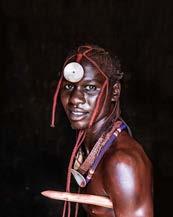
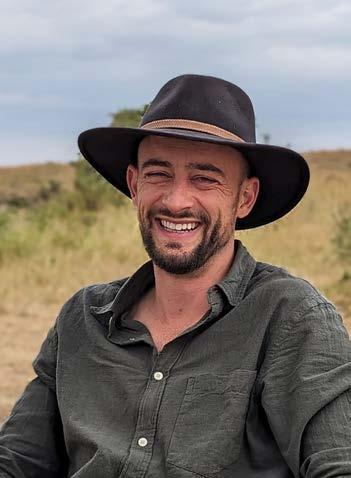
Tobiko was just 25 years old when he and two fellow warriors walked over the Loita Hills into the Olderkesi community conservancy on the Eastern boundary of the Maasai Mara, to visit fellow Maa in the Ololaimutiak and Olpalagilagi manyattas. Tobiko is one of thirty-one of his father’s children and the first of eight of his mother, who hails from Lakanga district in the Maasai Mara. Warriors will often set off into Maasai-land to see how and where their people live and to lend their services as shepherds for those who need flocks cared for. This they do for free, in return for food alone. At night they ‘lala porini’, sleep in the bush.
Tobiko and his fellow warriors were splendid looking; the long, uncut hair of lithe, powerful warriors, their hair braided and rolled in red ochre, a blue beaded necklace traditionally worn by only men and the sweet musk of perfume plant that is wrapped as a third necklace. These stood out in sharp relief as they posed, in the dark hut doorways, lit by the sunlight, knowing full well their beauty and its effect on me, the photographer. Each had their knife ready to be drawn for battle, a leather necklace
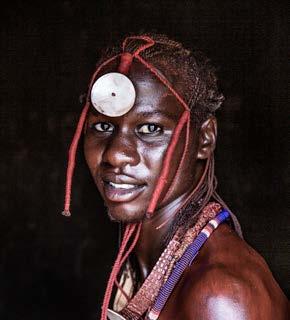
with the shells of monitor lizard eggs glowed against their polished dark skin that in turn rippled over muscles
Initially Tobiko and his friends had declined having their photos taken but were drawn to the camera and their interest piqued by the images they saw of the womenfolk. But they were vain and, in the end, vanity won over and they posed again and again, setting up their own photos and accepting or rejecting the outcomes. We used that timeless photographic technique that is easy for anyone; the dark hut doorways create a studio effect with the natural light outside. Features are enhanced, colours brought out in splendid
We ended the afternoon with some fun spear throwing before we each went our own ways. Tobiko married two months ago and will be thrilled to show his new wife his front cover Air Kenya appearance.
boydie@markboydsafaris.com

Thogoto Tree Planting: Airkenya embraces the reforestation challenge. Our team planted trees in Thogoto, Kikuyu as part of our commitment to environmental stewardship.


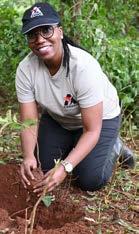
Nature Kenya Golf event: Airkenya drives climate action with Nature Kenya. Our sponsorship of the Nature Kenya Golf Tournament is helping raise vital funds towards saving our forests.


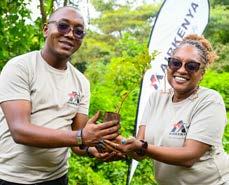
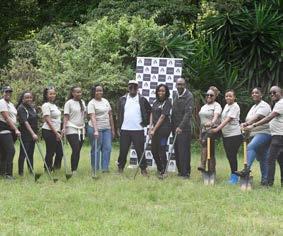



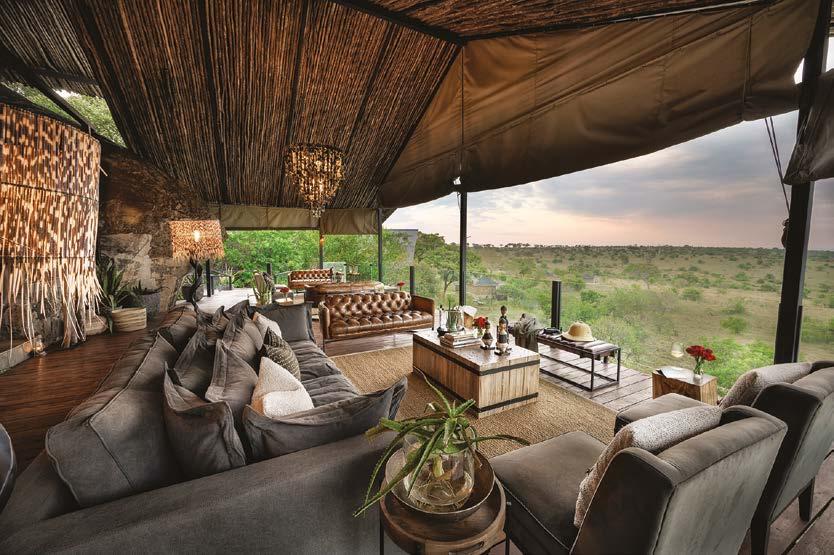



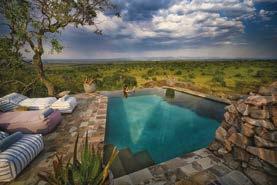

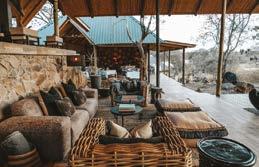

Men Talk: Airkenya tackles mental health for men. Managing stress and thriving both at work and in life is a fine balance. Simon Mbevi met with our team to explore potentially successful strategies.
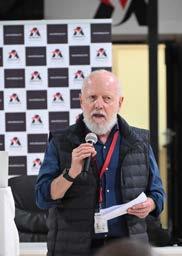




Women's Day: Celebrating Women in Aviation! On March the 8th Airkenya partnered with Women in Aviation Kenya for an event that inspired. It was attended by the Kenya Association of Air Operators CEO, Eng. Liz Aluvanze and Senator Gloria Orwoba.
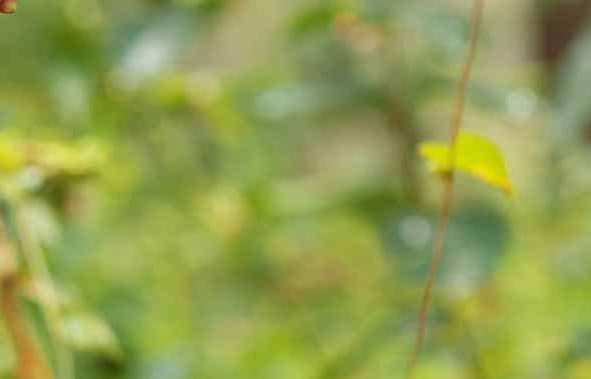

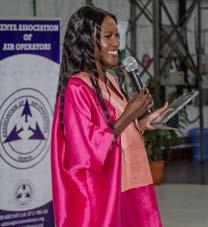
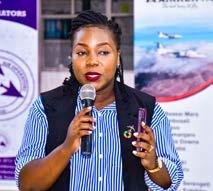

Charter: Airkenya's Bespoke Hangar Service takes flight. Experience the epitome of luxury with personalised amenities and preflight indulgence before you embark on your private charter adventure.
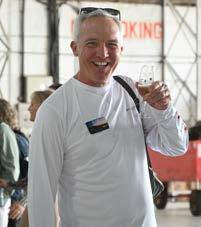
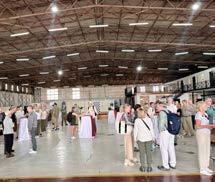
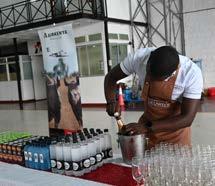
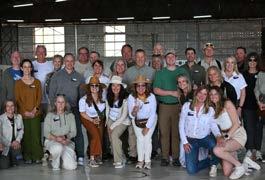
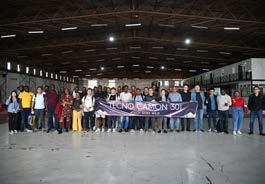


EXPLORE + LEAVE A POSITIVE IMPACT.
Enjoy impactful safari experiences in Kenya's Masai Mara and Samburu wildlife ecosystems. Our eco-friendly, boutique-style camps and lodges provide the perfect setting for unforgettable safari adventures.
Quote NDEGE10 to enjoy a 10% discount when you book on our website. Booking and Stay period: 01 May – 19 Dec 2024. Offer excludes high season (Jul -Sept). T&C Apply.

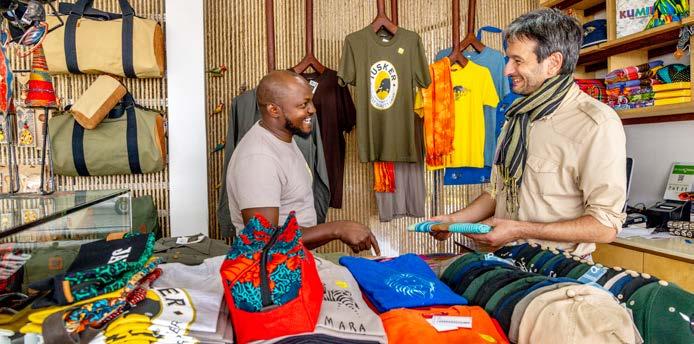
In 1998 Sarah Withey set about with a plan to link the souvenir-hunting tourist to the incredible talent and resourcefulness that is abundant in so many Kenyan communities. The idea; collaborate with Kenyan artists, craftsmen and women, provide help with product design and development, link the stories of souvenir creation and ultimately empower people, bring about positive and sustainable change with the result of quality hand-made souvenirs available across East Africa.
At 18 years old, Sarah arrived in Kenya as an actress and worked at Nairobi’s Donovan Maule theatre. Later she worked in the film world, including some interesting roles such as stunt double for the film star Susan Hampshire in the 1972 movie ‘Living Free,’ later as the local casting director for ‘Out of Africa’ among others. A passionate artist, with a love for African creativity, history and culture, she was always looking for opportunities to use her creative energy.
Her first creative tryst was into the world of ceramics and a business with Kenya’s well-known ceramicist Waithira Chege. She joined the African Heritage Gallery as their creative director with Alan Donovan and Kenya’s former Vice President Joseph Murumbi, working with a huge
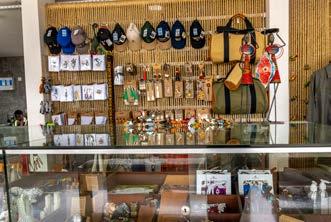
number of artisans from across the region. The World Bank once called the African Heritage "the largest and most organised craft organisation in Africa" and their Tuesday African Heritage buying day morphed into the Maasai Markets that you now see all around Nairobi.
Sarah left African Heritage to start Banana Box and now, many years on, has retired to Nanyuki on the slopes of Mt Kenya where she continues to work with, and advise a small number of artisans that live locally.
Her son Adam, took over the business in 2007 and shares much of Sarah’s love for creativity. Adam’s work with recycled metal has resulted in him setting up an artisinal foundry. Scrap metals are smelted in a small furnace powered on waste engine oil and each piece is sand-cast using waste sand from the glass industry. The range of Banana Box products has grown and has included making awards for the United Nations including the Champions of the Earth Award among others, medals for Oxfam and locally, awards for the Ecotourism Society of Kenya, World Fair Trade Organisation and many others.
A passionate conservationist, Adam also sits on the board of the Kijabe Forest Trust that supports a unique 6,000-hectare forest on the edge of the Rift Valley. The recent rains have caused massive landslides, partly resulting from forest degradation and deforestation and Adam’s work here helps communities living in and around the forest, to find ways to benefit from, and generate income from the forest in manners that encourage the protection and conservation of its rich biodiversity.
Kenya is a fascinating and diverse country with more than 40 tribes and languages. This proud and rich history, the vibrant and colourful cultures provide varied inspiration for an amazing and constantly changing range of crafts that Banana Box strives to harness and promote. The business is built on partnerships that foster dialogue, transparency and respect and, as a company with a 26-year history, many of these partnerships go back over decades.
In a world that is increasingly ruled by plastic, man-made fibre and non-biodegradable materials, the production of which often depletes and degrades the planet, Banana Box believe in sourcing products handcrafted from natural materials, such as banana leaves, East African cotton, hand spun Kenyan wool, environmentally managed timber, cattle bone and natural Kenyan soap stone. Banana Box encourages the use of only sustainably produced raw materials and, wherever possible, in recycling materials that would otherwise go to waste or pollute the environment. To this end they have a range of amazing products crafted from recycled scrap metal, paper (including paper made from elephant dung) and glass.
As our environment continues to be challenged by deforestation, soil erosion and an escalating human wildlife conflict, the alternative economic incomes that communities can earn from Banana Box support not just the small traders, disadvantaged groups and others, but also promotes African culture in all its many forms. Banana Box promotes gender equality and offers tangible empowerment which allows individuals to set up their own businesses.
Now that you know a little about Banana Box, we hope you will pass by their Airkenya shop or visit their shop in Westlands at Mwanzi Market. You can also find them online at www.bananabox.shop or follow them on Instagram www.instagram.com/bananaboxco and Facebook www. facebook.com/bananaboxco
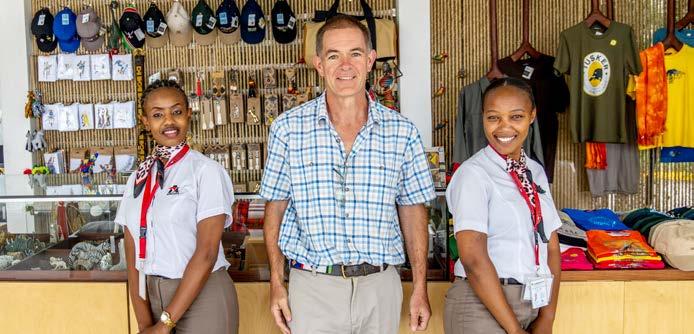
Regional Air conquers Kilimanjaro and elevates customer care. Not only did our team tackle an iconic marathon as a team-building experience but we are now primed for the tourist high season with a renewed focus on exceptional service.



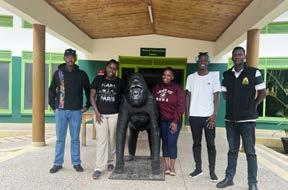
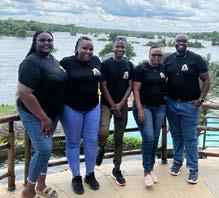

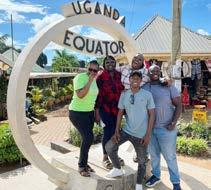
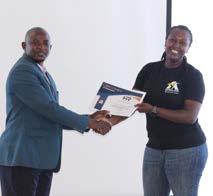
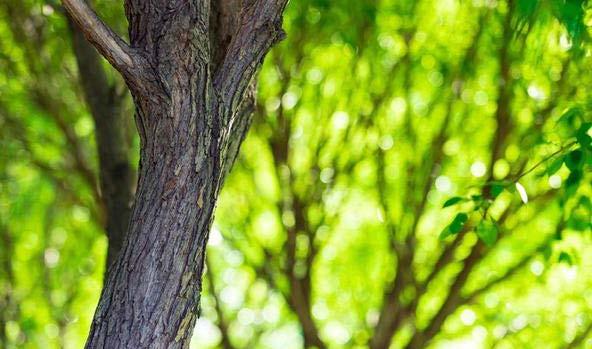
AeroLink enhances the customer journey. We've combined hands-on experience with focused training to ensure your travel experience is both exceptional and seamless from start to finish.
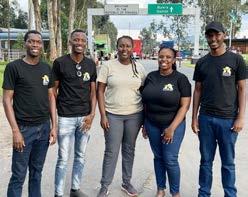
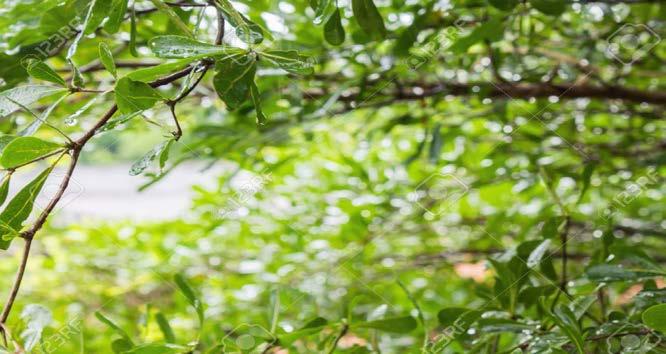
Across
[2] The language spoken by the Maasai people
[3] There are X species of tree hyrax in Africa
[5] The worldʼs heaviest flying bird alongside the Great Bustard of Europe and Central Asia
[8] True or false - hippos are not good swimmers?
[9] The mega-herbivore with the longest neck
[10] Bundles of muscle fibres are called this (found for example in elephant trunks)
[12] A aromatic Zanzibar spice which is collected while still in its dried fruit
[13] AirKenyaʼs souvenir shop and provider of fair and sustainable gifts that represent cultures, colours, language and tribes across East Africa
[14] The pygmy tribe that originate in the Great Lakes Region of Africa
[15] The name of the warrior whose image is front cover
Down
[1] One of the genera of Kenyaʼs Acacias which have long, straight thorns, and their flowers are spherical
[4] An insect that may eat its partner after mating
[6] An international charity whose homeland is in Meru
[7] The second most costly spice globally
[11] The other of the genera of Kenyaʼs Acacias which have hooked thorns, and their flowers are arranged on spikes
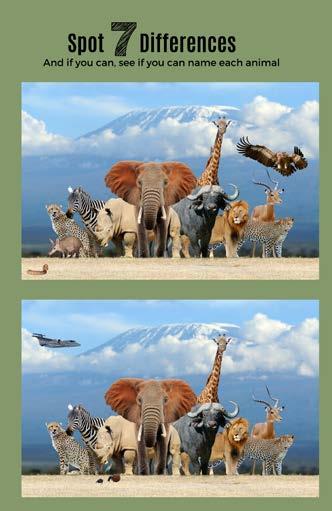
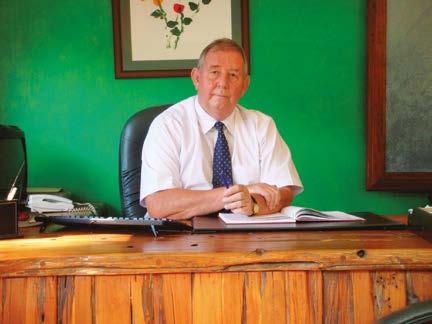
Sharing water is the key to conservation. In Meru you can get involved. Working together, let us help local communities have a dignity of life while at the same time protecting our wild heritage.
Dignified communities are critical to securing the future of our wildlife, which is why the international wildlife charity, Born Free Foundation, is developing projects in and around Meru National Park, so people and wildlife can thrive in this pristine corner of Kenya.
Communities can be very tolerant towards the wildlife that lives alongside them, as long as any interactions or contact do not lead to human injury or destruction of property. However, competing for the same resources like water can and does create problems. People tend to forget how natural systems are interconnected, that a healthy ecosystem relies on people, biodiversity and their habitats being in balance. When wildlife ventures into community areas in search of resources, conflict occurs when they encounter humans or enter farms. Property is damaged, there can be human or wildlife injuries, and even, tragic fatalities.
The water resources that sustain both people and wildlife within and beyond the boundaries of Meru National Park, flow through community land before reaching the park. Unfortunately, community need for water far outstrips the supply available, this due to poor planning and infrastructure, encroachment on riverbanks and water catchment degradation. This inequitable access to water amongst community members and a shortage of water flowing into the park, disrupts
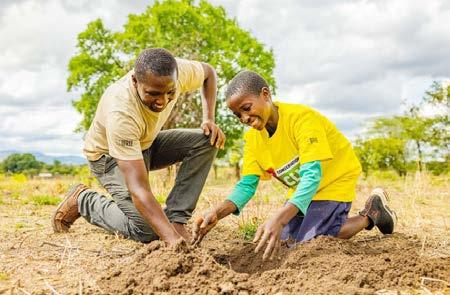
the wildlife's access to water and, ultimately, food.
Consequently, Born Free Foundation employs several strategies to counter these negative interactions and increase tolerance. Information and knowledge of water conservation can trigger attitude and behavioural change enabling more sustainable use of resources. When people know which of their actions save water, and how they benefit from it, they are better informed and encouraged to practice them.
Working with the right authorities to enforce regulated water extraction from rivers, enables a constant flow, enabling life to thrive alongside river channels and natural springs. Born Free encourages the formation of self-led Water Resource Users
Associations. We sensitise these groups in extraction law and ensure that all have a delegated responsibility and stake in the management, sharing and conservation of water resources. The focus here is conflict resolution.
To round up and connect these strategies, we go a step further and, through our partnership with the Water Resources Authority, support community water groups to develop water sub-catchment management plans. This enables them to have evidenced-based, tried, tested and approved interventions to conserve their water. By adapting the activities that have yielded positive outcomes and successes in other areas, communities are assured of water sufficiency, equitable use and healthy ecosystems.
Why is this issue important to us?
Meru National Park is the heartland of the Born Free Story and the cradle of the Born Free Foundation.
Water is vital for all life. Yet, due to changing climatic conditions both globally and locally, driven by a multitude of factors, water can and does become scarce. Water scarcity threatens the coexistence of people in Meru with each other and with the wildlife that has, for decades, lived alongside them. Only through coexistence will we be able to play our part in the protection of our planet.
The first of our major community led water conservation projects is the Bwathonaro Sub-Catchment with a geographical area of 382 km2, of which 232 km2 is community land and 150 km2 lies within the Meru National Park.
In June 2023, Born Free held a 10-day workshop to review the


existing Bwathonaro sub-catchment management plan and to help people understand the issues around sharing water. With attendance from multiple government, community, political and non-governmental organisation stakeholders, we facilitated the development of a new ten-year sub catchment management plan.
One of the crucial first steps was the identification of priority areas by the community. What do the users themselves see as the most important aspect in their efforts to conserve their water and enhance their livelihoods? Not surprisingly, they pointed to knowledge of the law and then enforcement as being key to water-use regulation. Other priorities included ownership, encroachment of gazetted water sources, water quality and quantity regulation.
Born Free is currently working with the Water Resource User Association to plan a workshop on leadership, governance and project management, on the basis that achievement of the ten-year plan is only possible with the right skills in the right hands.
Our community in water conservation partnership is on target to support the development of three sub-catchment management plans that will ultimately serve the people and wildlife in Meru National Park. Having completed one, we have two more ten-year management plans to go. Management plans that will ensure the survival, adaption and resilience of the people and wildlife amidst a changing world.
You can help. If you would like to know more, please visit www.bornfree. org.uk/kenya to donate and find out more about our work. Alternatively, please take time to visit us up in Meru so the community can proudly show you what they are doing.

In the mid 1980’s the Acacia genus was split into three separate genera (Acacia, Senegalia, Racosperma), but then DNA showed there were five separate genera. Throughout the 2000s, this unassuming collection of plants created the world's biggest botanical controversy: who gets to call their acacias ‘Acacia’? The result, Africa lost the name Acacia!
Why was the least disruptive solution to the Acacia name question to give the name to Australia? By weight of numbers, they had the more species and, Latin nouns have a gender. Acacia is feminine; Racosperma is neutral, so switching Acacia for Racosperma is not so simple. The ending of hundreds of species names would need to change to reflect this gender change. In 2005 and in 2011 the voting upheld the decision to give the name to Australia! Our African Acacias are now split into two genera: Vachellia and Senegalia.
This decision seems strange, as the word "acacia" came from the Greek "akis", meaning a barb or thorn. None of the Australian Acacias have thorns! And, if history counts, Greek philosopher and physician Dioscorides, who lived almost 2,000 years ago, prepared medicine from the leaves and pods of an African plant he called "akakia."
Here is how you can distinguish between Vachellia and Senegalia: Vachellia species have long, straight thorns, and their flowers are spherical. In contrast, Senegalia species have hooked thorns, and their flowers are arranged on spikes. This distinction helps clarify the classification despite the puzzling naming decision.

The two competitors for the world’s largest flying bird are both bustards, a bird that is related to cranes and rails. The Great Bustard of Europe and Central Asia is comparable in size to the Kori Bustard, an East and Southern African species. These birds can weigh anywhere between 7-19kg … and still take off, helped of course by the fact that its wingspan is over two meters!
The male has the most incredible courtship display called a lekking dance. Bustards often collect as a group on a lekking ground, inflate their necks to more than four times their normal size, droop their wings and show-off the iconic black crest on their heads. Their tail becomes erect showing off beautiful white plumage strikingly topped by black.
The males will hold their heads back, bulge out their cheeks and what issues forth is sonically amazing: A deep booming call that travels over large distances. They can call like this all morning before disbanding and regrouping later in the evening or the next morning again.

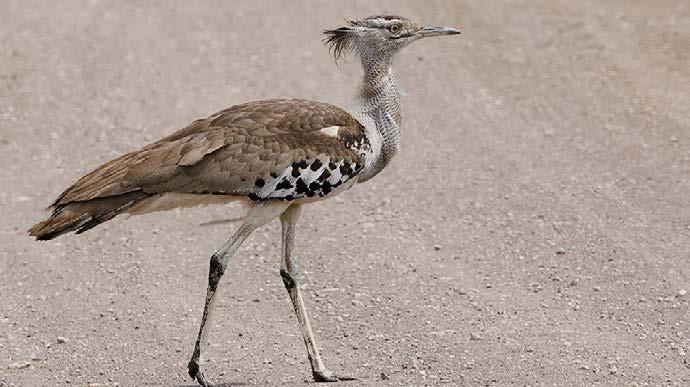
A troop of baboons can and will gang up on a leopard and kill it. A big ‘dog’ baboon can weigh 50kg and has razor-sharp canines up to 5cm long. These males can often be seen cooperating in chasing and stalking prey. In a leopard attack, sub-adult males and even females without young will partake. Leopards are the most effective baboon predators, but lions, spotted hyenas, chimpanzees, pythons and large eagles will opportunistically take baboons as prey.
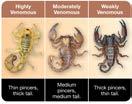

It is not true that smaller or dark coloured scorpions are more dangerous. The venomosity rule of thumb looks at the size ratio of the tail versus the pincers and is as follows: Thick pincers & thin tail = less venomous; Thin pincers & thick tail = more venomous.
PHOTO: By Jonathan Leeming
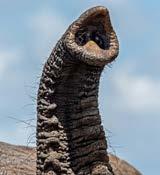
Elephants do not have as many muscles in their trunk as you have been told! They can indeed perform an astonishing range of complicated movements and tasks with this appendage. It is a sensitive, flexible and complex organ. There are only seventeen major muscle groups in the trunk, eight muscles each side and a central muscle between the nasal passages. These muscles though, are composed of thousands of muscle fascicles (bundles of muscle fibres) each surrounded by connective tissue. The muscles are arranged in three different directions which means elephants can elongate, bend, stiffen, shorten and twist their trunks.
Praying mantises suffer for love! In up to 28% of recorded instances, the female will bite off and eat the male’s head while he is mating with her. This may increase the number of eggs a female can lay. It will also mean she has enough healthy nutrients to form and lay eggs that will successfully hatch.
It is true that hippos are not very good swimmers. They tend to be found on the edges of rivers and lakes where it is shallower. They avoid the rapids and deeper pools, especially mothers and babies. Instead, they walk along the bottom, almost gliding along. Their bone density, buoyancy and robust limb muscles certainly help them attain quite fast speeds. A charging hippo will ‘gallop’ pushing off against the bottom and heading, almost porpoise like, towards its target.

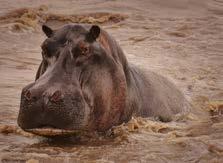






















































It is your first night in the bush; the crickets are kicking up a cacophony, the nightjars are sonorous and the frogs are tinkling when suddenly, a blood-curdling shriek emanates from right outside your tent. You sit bolt upright, terrified to hear what will come next ….
Shaken survivors describe the sound they hear as ‘a tormented soul ascending a creaking staircase and being murdered at the top’.
The culprit of these late-night intrusions is no axe-wielding psychopath. It’s a small, innocent-looking and very cute mammal called a Tree hyrax. The size of a small rabbit, minus ears, the hyrax is actually far more closely related to elephants than a bunny. They are though, very similar:
Hyrax have highly sensitive footpads, internal testicles and even brandish two tiny tusks. Like elephants, hyraxes are intelligent, and they have surprisingly long pregnancies for such a small animal, lasting 7-8 months.
There are two diurnal hyrax species, the Rock and Bush hyrax. Both live in gregarious diurnal groups; lounging on rocks, sunbathing around lodge swimming pools, darting amongst the tent base struts often apparently oblivious to the human activity around them. Nocturnal tree hyraxes are secretive and solitary, spending the day in tree hollows or caves and coming out at night to feed on leaves. They are mostly found in forests, although they can also be seen in riparian woodlands along savannah edges.
There are three species of Tree hyrax in East Africa: the southern, eastern and western, each of which has a distinctive vocal repertoire. The first two are relatively easy to see as they often frequent lodge gardens. Ask the

night-watchman to let you know when they are out; trust us, if the species is around, they will have heard them!
The western Tree hyrax on the other hand, is a regular Houdini. We can think of no other mammal that is so easy to hear yet so difficult to see. The western is a Congolese forest species which can be found in the western parts of Tanzania and Uganda. Its fur is dark brown or black, and its call is even more demonic than the others – a long series of high-pitched screams. You would expect that finding an animal that makes so much noise would be easy. Not so! These small animals seem to project their calls like a ventriloquist! If you do manage to get close to their tree, they stop calling and sit tight. Their eyes produce remarkably little reflection from a torch light, so they blend in against the tree bark, making them extremely difficult to see. Mammalwatchers (including the authors) have spent days looking for these enigmatic little creatures, without success.
In a previous time, Tree hyrax fur was highly valued for its softness and was used by the Chagga of northern Tanzania to make blankets. Many thousands of eastern Tree hyrax were caught with snares each year on Mount Kilimanjaro. This stopped in the 1980’s and fortunately Tree hyrax are still common and widespread both on Mt Kilimanjaro and across East Africa.
If you do wake up to some horrific screams in the night, rather than cower under the bedclothes … grab a torch and try to see a hyrax.
If you are interested in learning more about unusual mammals in East Africa and where to find them, visit mammalwatching.com.
Jon Hall began mammalwatching in 1991 when he lived in Zambia. In 2005 he set up www. mammalwatching.com, the world’s largest mammalwatching community. He lives in New York.
Charles Foley is a senior conservation scientist at the Lincoln Park Zoo in Chicago. He has worked in wildlife conservation in Tanzania for over 30 years and is an avid mammalwatcher.
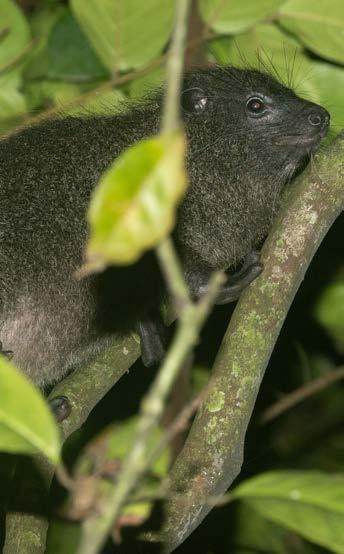
Southern Tree hyrax: Lodges in Nairobi and Arusha, Tarangire NP and Ngorongoro Crater CA (Tanzania), Mgahinga NP (Uganda), the Aberdares NP and Masai Mara GR (Kenya)
Eastern Tree hyrax: Jozani Chwaka Bay NP (Zanzibar, Tanzania), Amani Forest Reserve (Tanzania)
Western Tree hyrax: Budongo Forest Reserve (Uganda), Minziro Forest Reserve (Tanzania)
“Alongside
education they can now say, money is not enough, I want dignity.
Today is not enough, what about tomorrow?”By Hollie M'gog
‘Several major groups of Pygmies live across Africa, mostly in the Congo basin, there are at least a dozen sub-groups, some completely unrelated. In the Eastern Congo basin in Zaire there are the Mbuti and the Twa. In the Western Congo basin, the Aka (Mbenga) live between the Ubangi and Sangha Rivers, The Baka (also Mbenga) live West of the Sangha, and the Bongo live in the Ogooué River basin, in Gabon. Within each clan there are smaller clan divisions. The Ba-Benjellé are
the westernmost clan of the Aka; their territory includes some of the least known rainforest in the world’ says Louis Sarno. The Batwa (Twa) originate in the Great Lakes region. They were all originally mostly hunter-gatherers, trading with more sedentary ethnic groups that lived around the forests. Music permeates daily life and activities, events, entertainment is all accompanied by a polyphonic complexity still studied today. What is certain about these groups is they are of ancient indigenous lineages
and have stepped into a modern and unfair world where there are little means of economic opportunity and high rates of poverty.
In 1991 Bwindi Impenetrable Forest was declared a National Park, and the Batwa, the pygmy-hunter-gatherers of this island patch of forest were displaced to the green, sometimes rainy and sometimes dry forest edges. Labour in exchange for food became life. The same happened in the south around the Virunga massif,

Mgahinga National Park. A whole way of life changed – no more the meat of a forest duiker for dinner, no more the setting of pit traps or tracking of small wildlife species, no more the collection of wild honey or forest plants for medicine, superstition or food. No more 10,000 years of history and dances loaded with suggestion for the future and probabilities for tomorrow, no more a forest culture that had stretched across thousands of kilometres of central African forests.
Now began the struggle for a dignified life for one of the oldest surviving indigenous tribes of Africa. Their futures were schools and vehicles, new cultural norms and livelihood initiatives including agricultural learning, supported communities and, if you veered down an alluring but troubled path, then bars and alcoholism, social exclusion and debt. The Batwa learnt to till the land in a way that their people had never before done. All this alongside forest protection, conservation initiatives for forest elephant and mountain gorilla, scientific studies done on forest resilience, edge-effects, bird species richness and population densities. All skills that the Batwa had unknowingly excelled in.
Those who had a strength of vision and a desire to go somewhere, went there with an amnesia they had no say in – if they reached university, it is because they worked hard, scorned all the possible derailing attractions but, by necessity almost, left behind their intricate forest knowledge.
From the nomadic Batwa people to the sedentary Mutwa person (Mutwa is the singular word for Batwa). There are drives to ‘preserve and share the history of the Batwa.’ Now there is marginalisation, displacement and an ongoing struggle for recognition and rights. This is not just a recent marginalisation, this has been ongoing for
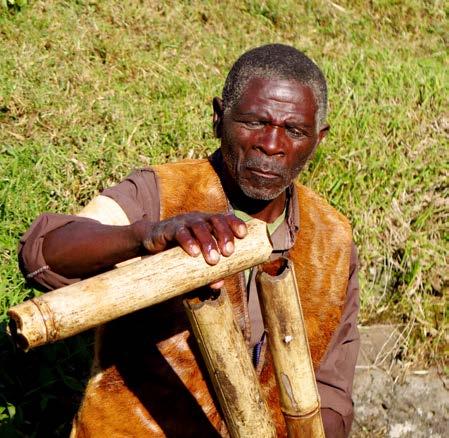

centuries – it’s just that population explosion and land ownership changes, park boundaries and governments, the slow infiltration of Western ideals and conservation practices into communities, have meant that the traditional way of life, that against all odds the Batwa people had kept a firm hold of, is now really at risk of disappearing.
Often, in places and circumstances such as these, the church steps in. The Kellerman Foundation funded both through private donors and the Anglican Church of Uganda, established the Batwa Development Program (BDP), which started with schools and a clinic and morphed into something even bigger.
Now traditional tours, walks, dance performances, Batwa craft sales, health programs, schools – all are
initiatives to bring Batwa communities back together, to turn them from squatters on the land of others to proud land owners themselves. To help them move from shabby, no-sanitation camps into huts that provide a decent standard of living … at least in comparison.
Time, tourism, religion and development bring change to any community. While the elderly worry about the future of their people, about the unparallelled knowledge loss of resources, the young want opportunities: University, jobs that allow them to buy a car, dabble in new music forms and freedom to move. Most of these young either have no tangible memory of life in the forest or really have never lived there – what traditions do they keep hold of then? The next best answer –forest school for Batwa.
One hundred acres of BDP purchased secondary forest, right on the edge of Bwindi Impenetrable has been allowed to regenerate, often with the help of seeds collected in the forest. In school holidays Batwa children are encouraged to come back here with their parents or grandparents, to learn, practice and remember their special culture; net hunting, harvesting wild yams, starting fires, building bee-hive houses and sleeping in them overnight with evenings of storytelling and questions on medicinal plants and language. Through the pandemic struggle years this was a saving grace to many.
BDP primary and secondary schools are mixed, young Batwa read and write alongside non-Batwa but all children are provided with school meals to aid with food insecurity and malnutrition. Those who have reached even higher have earned Master’s degrees. One iconic lady, Sylvia, came back and started her own Batwa empowerment organisation,
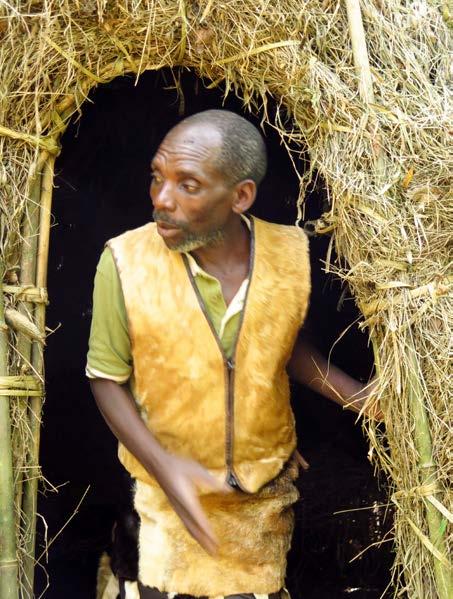
and was in fact invited by the UN to talk of that empowerment and the future. Nursing students have returned, qualified to give back to the health of their own people. All Batwa people qualify for a hospital health insurance that covers even major surgeries or treatments in the city. A BDP motorbike will pick-up and drop-off patients free of charge. BDP has bought an interlocking brick machine which means that wood-fired clay bricks are soon to
be a thing of the past. The aim: well-built, well-ventilated, environmentally friendly houses with safe roofs and concrete floors to deter chiggers from the feet.
Those Batwa involved in local dance shows are not paid per dance, instead those who wish are paid monthly to partake in sharing their culture through local dance, cultural tours and forest experiences. Should they decide not to dance on any one
day, no-one worries. It is all about freedom of choice and exuberance of expression. Obviously, the name ‘Batwa’ is now a potential dollar earner and it is useful to carefully determine whether the experience you are embarking upon is legitimate, as several ‘fly-by-night’ groups have sprung up that pretend to offer authentic experiences and dances.
Intermarriage is more and more common and children from these marriages are not excluded from all the above care. It is only in later times, should individuals and families move away from the region and out of the sphere of care, do they forfeit all the support – hopefully by this time they are self-supporting, educated and ready to make change happen.
Charity works as a guidance counsellor and mentor to children specifically, and adults if they ask. Her job is massive: To get the young Batwa children to love and stay in school and to guide the parents on how to support their children through a vital education, which the BDP sees as the only weapon against marginalisation. On her own accord, Charity also interacts with the nurses at the hospital to gain knowledge on how specifically to talk to the girls on avoiding early pregnancies, and if it’s too late, to help individuals through difficult pregnancies and sensitise them to family planning for the next time. The BDP team talks openly about STD’s and HIV. They encourage parents to provide activities for the children in holiday-time to both encourage agricultural and
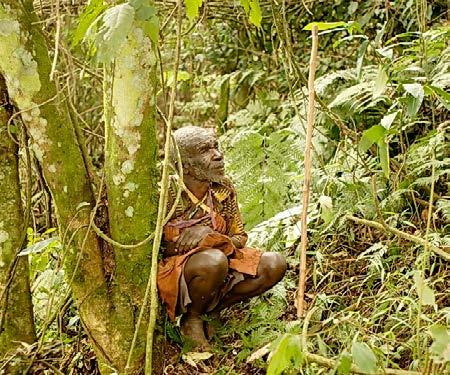
traditional knowledge building, and to actively deter impressionable minds from theft and loitering, alcohol and marijuana, the two most oft available drugs. Human rights are taught and Batwa are armed with the rights to make decisions for their own lives. Alongside education they can now say, money is not enough, I want dignity. Today is not enough, what about tomorrow?
Donating funds allows for land acquisition, home building and agricultural training, scholarships and medical support. Visiting the communities around Mgahinga and Bwindi to partake in the music, the dances and the storytelling does
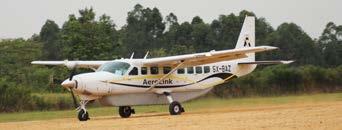
help. It encourages traditions and meanings to continue their existence, it allows the elders to proudly reminisce and recount memories, it allows the young to bring to life the stories of their parents. The rhythmic drumming, the soulful singing is a way to spread hope, it allows you to become an advocate for their future, it lends empowerment to a unique heritage.
Any donations are welcome through The Kellerman Foundation website and we encourage all Buhoma visitors to stop by the Batwa Craft Stall just before the main gate and sponsor one pack of reusable sanitary towels … just one!
I had been nervously cajoled into a full moon yoga session. My previous experience centred around a Vinyasa Flow Yoga session in Lamu, a yoga form that is said to offer a meditation in strength, flexibility, concentration and breath work. A great starting point for beginners they promised. The one-hour exercise seemed like eternity and the poses all felt like torture to me. I couldn’t wait to be done and to resume to my usual explorations.
But this time round, things were different.
A single moment happens when your mind is focused, melded with
By Harriet Jamesspace, place and time. Of course, the atmosphere and the state of the weather are all a part of that magic moment when you find yourself suspended not just in time, but in thought and in a delicate discussion with your own body. Willstone Kalaghe, backed by the African wilderness, promised a laid-back stretch session, as the sun dipped into the horizon painting the sky in hues of orange and gold.
Mats were unfurled upon the earth, facing eastwards to welcome the soon-to-rise moon, a silent witness to this ancient practice. Cicadas, reed frogs and the occasional snorting antelope were to add symphony to
our stretches out there on the pool deck at the JW Marriott Maasai Mara Lodge.
First an exercise of centring and grounding. Eyes closed, navels to the darkening sky, Willstone guided us in breath. Yoga may not be for all, but this simple act of remembering why you are in the moment and what brought you there, brings greater appreciation to the fuller safari experience. It’s a moment to stop, think, breathe and allow your senses to capture the moment. The gentle warm up is like tonic for an aching back, weary arms or a stiff neck.
Asanas honour the body’s strength,
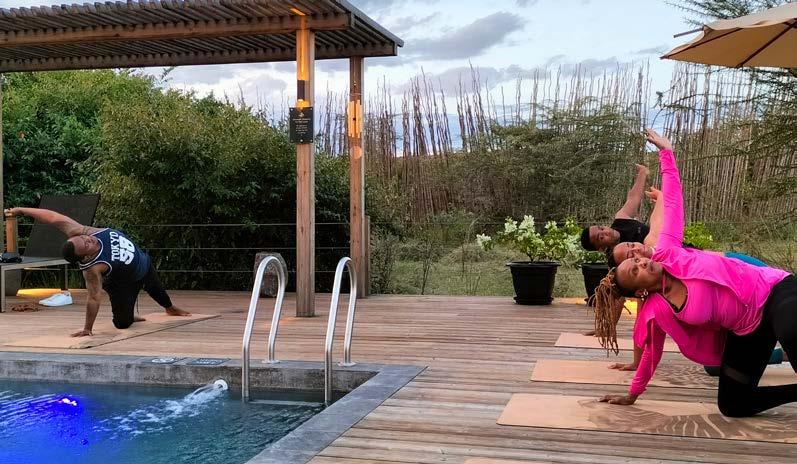
flexibility and grace and it’s fun to court the warrior poses, to open our chest and shoulders in the crescent lunge pose. “Full Moon Yoga in the Mara is not merely an exercise in physical flexibility, but a soul stirring communion with nature,” intoned Willstone as he went around, gently altering our poses. “The essence of doing the evening yoga is to get the body relaxed for sleeping or rest after a long day’s work.”
Out on the deck, where the view is unparallelled, where aesthetic structures dip into natural beauty with the help of soft artificial lights that draw your gaze into the distance, I felt at peace. The skies were clear, the stars washed out by a sublime moon. The air is crisp and clean, free from pollution. “It’s quiet,” Willstone whispered, “there are no city lights impinging on the darkness, no growls and revs of engines. Yoga brings you one step closer to the universe and harmony. Doing this in the wild gives that sense of being in touch with nature.”
It did make me smile as we enacted the dolphin pose that stretched out lower backs, the puppy dog pose that invoked a waggly tail, the upward and downward dog poses that any wild dog trotting past would have thought ludicrous and yet enacted daily.
A chat with the Group General Manager, Barnabas Wamoto, helped me understand the lodge and the carefully curated experiences that they offer their guests. Different travellers have their own meaning of what they deem as an authentic or luxury travel experience. Provided that the experiences are unique and distinct from other places they have travelled to; or they are organic, the visitor will develop an emotional connection to the destination.
At the centre of this transformation are the millennials. New travellers
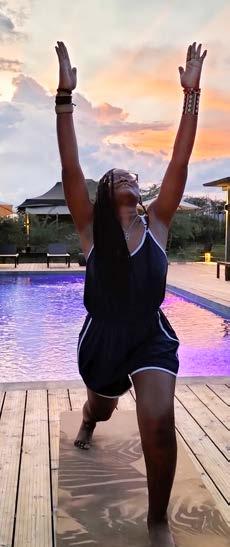
reshaping the luxury travel industry. In view of this trend, many luxury hotels and lodges are reviewing their products to ensure that their experiences go beyond booking hotel rooms. Memorable experiences for guests mean making use of all of our senses; taste, touch, smell, sight and sound. Spas and safari massages will always be popular, but change has brought the desire for fitness, for movement and health. Yoga, Pilates, simple workout sessions; many lodges provide simple stretch equipment in the rooms now.
JW Marriott Hotel and Baraka Lodges LTD overlook the Talek River on the edge of the Masai Mara game reserve and their mindful retreats offer guests a harmonious backdrop where they can discover spectacular vistas, abundant wildlife and endless plains all alongside tranquillity and space to centre oneself in.
In addition, to make their Mara camps a year-round destination that will draw you back again and again, they offer a wide range of wellness products. Their yoga package is one of the experiences under the Mara fitness and wellness centre which includes the spa and a fully-fledged gym-in-the-wild.
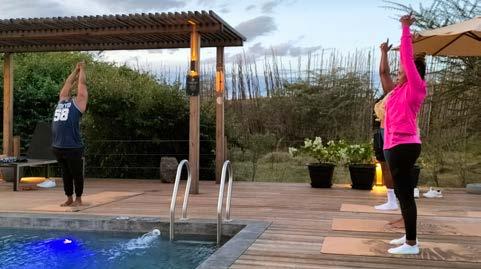
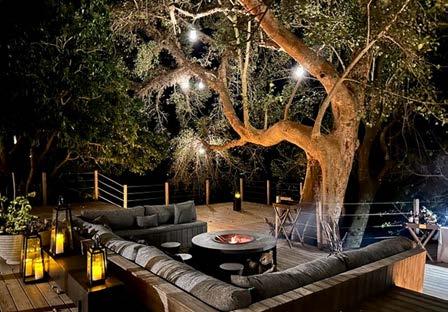
“We call it a spa-fari experience!’ grinned Barnabas. “We are the only property in the Mara with a gym that will rival those in Nairobi or other high-end international properties. To focus on the health of mind, body and soul, we ensure that we hire qualified therapists, fitness coaches that can feel the wilderness and build it into any workout. Our chefs tailor menus that draw fresh foods from our organic kitchen garden.“
The moon had risen now and the sky was clear, our line of vision to the heavens tangible as we drew closer to each other, faces upturned. In this moment of unity, our gratitude to the universe flowed freely, like the gurgling Talek river, a seasonal river that threads its way through the Maasai Mara. In the yoga way,
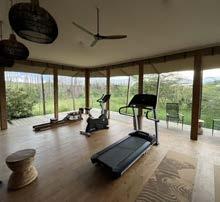
we openly expressed gratitude to the stunning Mara landscape and the privilege to experience it, the gift of the community and the transformative power of yoga.
As we departed, each to our own chalet, I carried with me the memory

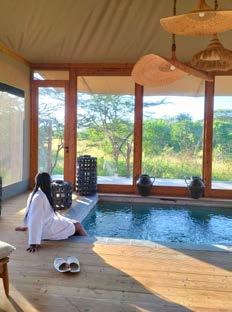
of a magical experience beneath a full moon. I felt light, thankful and perhaps a little more supple.
Should you need to overnight at JKIA, The Crowne Plaza would only be too happy to host you. An overnight that will allow you to finish your East Africa experience with a rewarding stretch. Like many properties on the Talek River, JW Marriott suffered flooding as the rivers overflowed their banks due to inordinate heavy rainfall, leading to an overwhelming volume of water that the river channels could not contain. Although the tents are elevated and reinforced 6m above the ground, three were damaged. The team is restoring each to ensure the highest guest quality. The camp will reopen on July 15th.
AirKenya operates daily flights from Wilson Airport to the Mara and its surrounding conservancies.
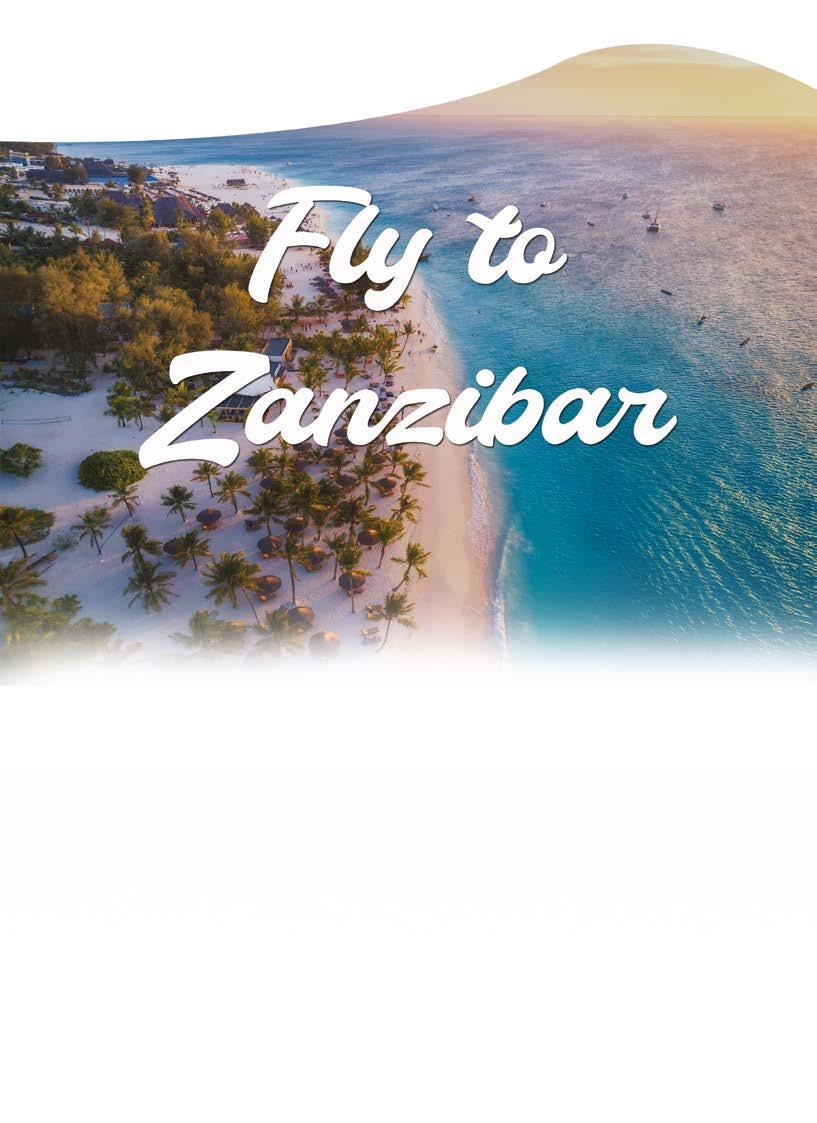


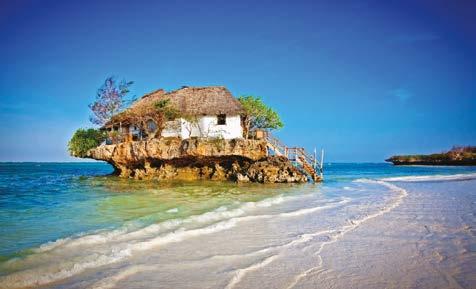
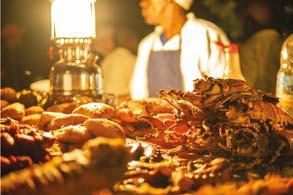
It’s a horizontal start in the pre-dawn light that sees just twelve of us lifting gently into the air amidst the loud roar of the balloon burner; powerful blue flames topped with orange, heating the air in the envelope … a three-minute white-knuckle adventure until our Turkish Captain Baris gave the stand command and then, there beneath us, the central Serengeti sprawled. No need for extravagant words or flowery descriptions – just the raw, unfiltered beauty of nature awakening. A vast expanse of green (or golden depending on the rain) grasslands dotted with acacia trees. At first, we hung low, barely skimming the tree-tops, a subtle silence enveloping
By Hollie M'gogthe passengers, broken only by the occasional whoosh of the burner igniting. The landscape unfurls beneath you, an intricate Serengeti tapestry. A landscape shaped by eons.
Amber and rose hues paint the horizon as sun and balloon ascend. The air is crisp, carrying with it the earthy aroma of the awakening wilderness. As the balloon drifts gently, you find yourself in a ‘pinch-me’ moment, suspended in a tranquil ballet between sky and earth. It takes some moments to pull your eyes away from the enormity of the wilderness to begin to scan the plains below for ambling elephants,
sunning gazelles, bare-faced vultures still at-roost in trees, perhaps even a lion pride a-top a rock kopje (not my balloon, but definitely a possible sighting!)
Captain Baris held the wind in his deft hands as he piloted us almost at water level, not once but twice, above pods of honking (in both senses) hippos that yawned at us, warning us to keep to the air. The water is their realm. Giraffes stood like sentinels among the trees, baboons sunned their bare bottoms on warming rocks and a pair of secretary birds brooded a young chick below us, as fiery exhalations propelled the balloon to 3,500 feet.
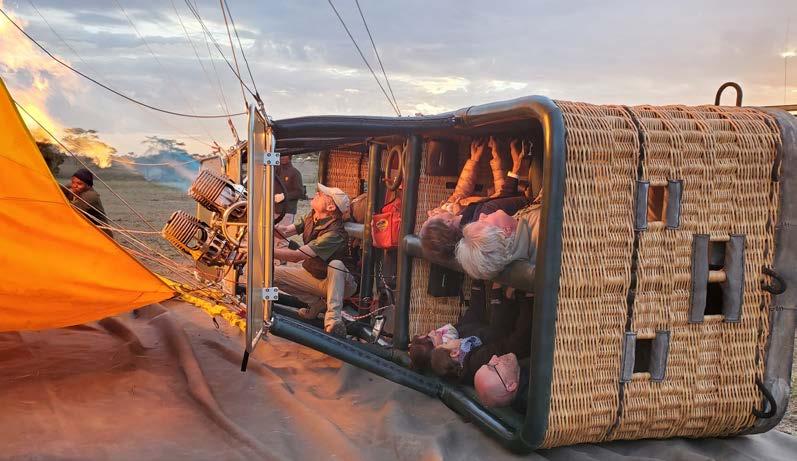


At this height, the heartbeat of the land resonates through the air, a rhythm dictated by the eternity of existence witnessed by the landscape below. The balloon's up-down trajectory allows for a fluid dance with the wind, a magical way to witness the ever-changing contours of the Serengeti; from flat and uninterrupted savannah plains, to balancing rock formations, small woodlands and water systems over which white steams of egrets fly, heading out to their morning rendezvous with the thousand strong herd of buffalo.
The grasslands transition from gold to green, green to gold and the wildlife below appears as a living mosaic, seamlessly blending with well-trodden trails that mark their movements. The hot air balloon, an (almost) silent witness to this spectacle, offers a perspective that transcends the ordinary, an experience that allows you to appreciate the intricate interconnectedness of life in the Serengeti.
There are three types of landing, wind permitting: A single bump and an elegant basket decent, a bumpety-bump-bump and a horizontal slide from the basket or a theme-park drag of 50m or so. But even as you bump to Earth, the balloon seems to want more – furling and unfurling, billowing as the warm air escapes.
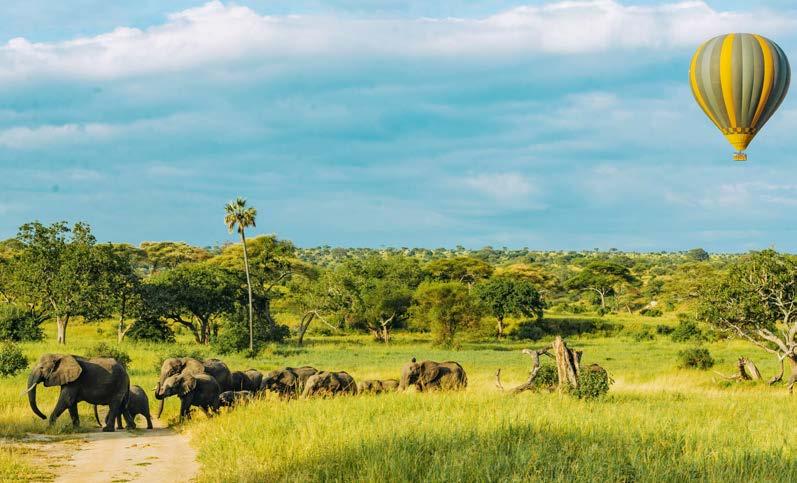
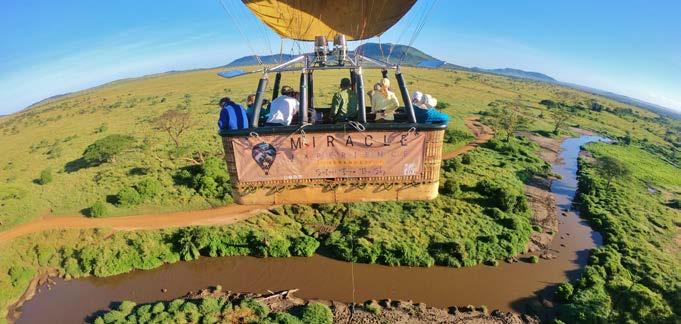
But it’s still not the end … a bush breakfast under canvas remains, croissants and eggs, a loo-with-aview, a champagne toast in memory of the first successful balloon flight undertaken by a daring individual named François Pilâtre de Rozier, a Frenchman with an unyielding spirit of adventure. Pilâtre’s inaugural flight lasted only about 25 minutes, yet its impact was immeasurable. It marked not just a personal triumph but a transformative moment for humankind. The boundaries of the known world expanded, and the notion of defying gravity ceased to be a mere fantasy.


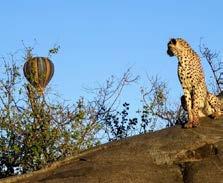
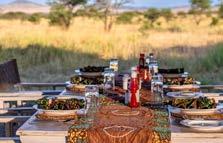
Regional Air Services offers daily scheduled flights to Northern Tanzania. It also offers charter services across Tanzania.
Additionally, Regional Air Services provide a daily scheduled connection from Northern Tanzania to Kenya’s Maasai Mara.
 By Hollie M'gog
By Hollie M'gog
... then Nimali Lodge in Central Serengeti is your place and Walkin is your chef. In its truest form safari simply means a journey: a beginning, a middle and an end. As marketing took over and the West appropriated our word into their tongue it has become ever connected with wildlife – vast herds of wildebeest sauntering across Serengeti plains, elephants reaching with their ever-inquisitive trunks into tree tops and giraffes standing watch over grasslands that wave green or golden as the seasons ebb and flow.
This ebb and flow are sometimes what we need to escape to, as city life jostles and hustles us into lines and meetings, reminds us of emails and phones calls still to be made,
Seating for lunch
pulls us to and from shopping malls to school pick-ups and club drop-offs. There comes a time when you need to take a break, to slip into a rhythm that takes all that clutter away … not more cars and game drives, but a safari that is about place and ambience.
Nimali is stylish luxury in a place that exudes only calm. Just four nights away will reset you mind and your soul. It will set you to reimagining life, setting new goals, making new decisions. A sundowner on a hill that looks out onto herds of ambling ellies, the clink of glasses and the crackle of a small fire as the sun sets, ochre and golden behind the hills.
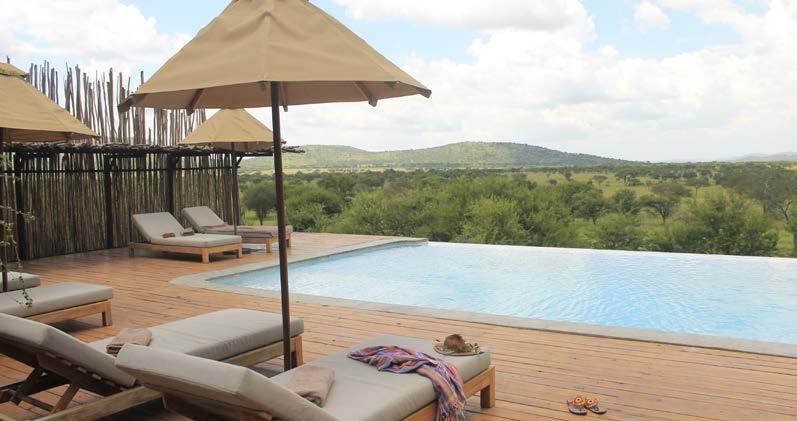

It’s a holiday rhythm that will (and should) be dictated by the quality of food conjured up by Walkin and his kitchen team, from pan-fried red snapper with a butternut puree and a side of seasonal vegetables, crushed baby potatoes drizzled with a lemon butter sauce, to roasted beef ciabattas, crumbed pork chops and mélazana vegetable stacks. Beetroot and mushroom skewers, penné pesto pasta with baby marrows, cherry tomatoes, parmesan, mushrooms and peppers. Oh, and the desserts! They

are like no other … fresh fruits, fudge chocolate brownies, crème brulés with shortbreads, glazed donuts and malva puddings with an Amarula, rooibos and apricot sauce. Service is simply beyond the best with Anderson and Peter who attend to guests both up at sundowners and all places in the lodge.
Of course, a good meal needs an after-food-snooze and the Nimali pool, set privately to the side of the mess area, draws you to it. An infinity pool stretching into the hills,

the water seemingly dropping over the edge into the vista, burbling and tinkling as it is fed down a ramp and back into the pool. Its three depths mean that you can stand, arms wide at the drop-off edge embracing all that lies before you, or you can sit, water to your chin listening to the silence. Simple sun loungers beneath trellises or sun umbrellas offer a shady spot for a shandy, while there is plenty of room for the sun-lizards who want to bask to golden-brown.
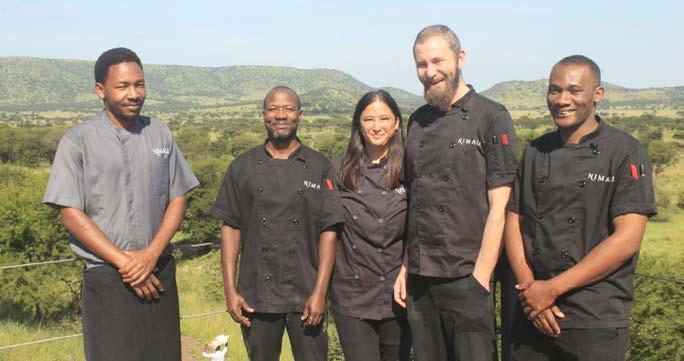
It’s hard to decide what to do on a late afternoon/evening as the temperature begins to drop. Do you pull your feet up under you, a small part of the Serengeti laid out before you, with a chocolate topped croissant and a pot of Earl Grey? Or perhaps a cold beer, a chilled wine with condensation beads and a bowl of home-roasted matoke crisps? Then comes place. There are the cushioned benches beside a crackling fire, incredibly comfortable couches set one level up with an unimpeded view, or, perhaps on overstuffed, less formal, put-you-feet-up couches on the flag-stoned verandah.
Luxury is a sense in the Nimali rooms. A free-standing bathtub that pulls the Serengeti view into focus before you, an outside shower that lends mood to bathing, a large wooden deck with a swing-seat that calls for a pre-dinner private cocktail, and, should a Serengeti storm sweep in, all black clouds, thunder and lightning, a comfortable front-row couch.
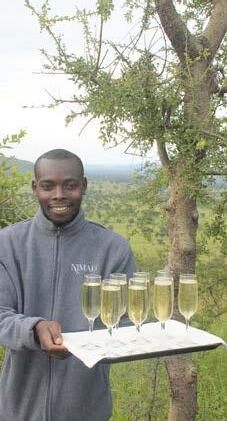

It is a hot day in Nairobi. A very, very hot day. The sun boldly blazes in the clear sky. Today, we find Uli and Tata seated in the disappearing shade in front of their house. A dust devil spins past and a lizard, mid skin-shed, dashes behind a huge black water tank. Salty sweat streams down Uli’s face. She looks up and there, in the last of the shade, the sun rays touch the dried leaves of a banana tree. The leaves shrivel up and turn to dust!
‘It can’t possibly get hotter than this’ Tata pants.
Uli frowns as she realises that her mother’s only potted flower is about to come into the full sun. She leaps up and rushes to the flower, but the sun-rays get there first and the flower crisps and turns to dust in the unbearable heat!
Uli kneels beside the dead flower, she is near tears. Tata approaches his sister and lays his hand gently on his sister's back, comforting her.
“Come on Uli, let’s find something to cheer you up?” Tata says.
The two kids stand up and enter the little store that sits in their front yard. There is always something interesting to keep them occupied in here. The store is full of junk. Things like old water pipes, torn shoes, a broken tricycle and cartons of many other unknown things. Uli sighs as she sifts through them, looking wearily for something to play with.
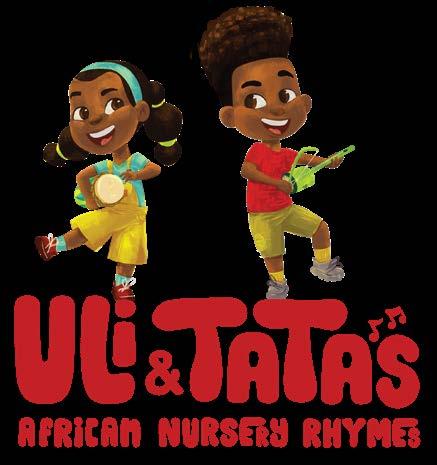
Tata moves to one corner of the room and his eyes catch sight of something. Pulling at a webbed string, he drags to the surface of the pile, an orutu and bow. Uli, now excited joins Tata and digs in herself until she finally finds a drum.
‘Look Uli!’ Tata cries, we can play music.
‘Bang, bang, thump!’ Uli hammers on the drum with her fists. The sound is pleasing, loud and hollow. ‘Look at this bird carved on here,’ Tata shows Uli a beautiful carving on the side of his orutu.

‘Mine too!’ responds Uli with surprise as she too finds same carving on the side of her drum.
‘Thump – bang – PUNGULU PA!!’ The children bang the drum and twang the orutu string. They giggle and look excitedly at each other as they dance into their front yard. Thump – bang – Pungulu Paa – Paa - Paa! Giggle – giggle. What fun!
Suddenly a shadow falls upon them, shielding them from the smouldering sun. Uli looks up and to her surprise she sees a great blue turaco, and he too is singing!
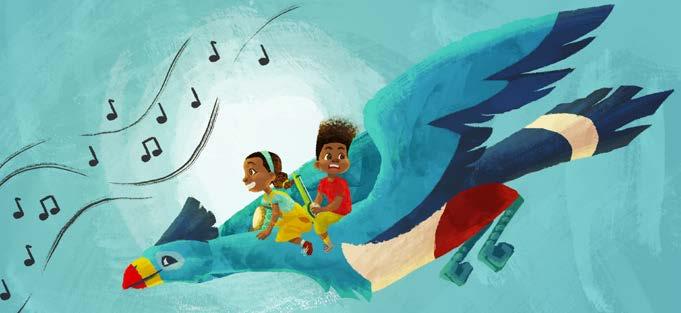
‘Hello Uli! Hello Tata! I am Tuki, the singing Turaco!’ sings the bird, ‘you have been playing the magical sound of Pungulu Pa which called me out of the sky.’
Tata looks down at his orutu and notices that Tuki the Turaco is the same bird carved on his orutu and on Uli’s drum. He feels an immediate affinity.
‘Tuki, we were bored and it is too hot to play!’ says Uli.
‘Far too hot!” Tata wipes the sweat from his forehead.
‘Yes, my friends! It is very hot and very dry. There is little shade and very little water,’ agrees Tuki.
‘What can we do Tuki?’ asks Uli.
‘We must plant trees!’ exclaims Tuki, ‘trees encouragerain. Rain water brings life, and cools the earth!’
‘But Tuki, where will we find the seeds to plant trees?’ asks Tata.
‘I know the best place to find seeds! Come with me to Kakamega!’ announces Tuki.
Uli and Tata clamber onto Tuki’s back, Uli with the drum strapped to her and Tata fastening the cylindrical orutu bag across his shoulder.
Tuki sings as he climbs into the blue sky, the children on

his back. His song, Tsimbindi echoes the childrens earlier play. He soars to the edge of the Rift Valley and drops into it, skirting Mt. Longonot to his South, over the flamingos on Lake Elementaita, the rhinos in Nakuru National Park, up over the western wall of the Rift Valley and over the Kericho tea. It is wetter and greener beneath them now. Trees reach towards them, canopies alive with birds. Soon the bright greens of Kakamega Forest come into view, lush and alive with the melody of song.
‘These old growth forests give us clean air and fresh water to drink,’ Tuki tells them. ‘We can collect seeds from the big mother trees and plant them in places where they have a chance of growing. Although it takes time for a tree to grow, we can learn to nurture and love the whole skill of growing – people who get good at it get green fingers! As these trees grow, they create forests, which attract rainfall, and those forests create shade and are home to many animals including birds like me!’
Uli looks down at her fingers and thinks how much she would like to be the one to bring fresh air, clean rainfall and shade to her family. Tata looks at Tuki and knows that he wants to grow trees to give birds like Tuki a place to live, a safe place to sleep at night and build their nests.
Tuki glides into a small forest clearing, a silver stream weaves down the middle of it and, lightly stepping amongst the ripples, a forest duiker sips delicately.
‘Quick, we don’t have much time before Mama comes

back,’ says Uli. She and Tata scramble about filling their pockets with seeds to take home. Then they cup their hands and drink from the clear stream before Tuki loads them upon his feathered back and they begin their flight back to Nairobi. As they fly, Uli and Tata drop seeds, each one magically followed by its own little rain cloud. They glance over their shoulders down onto the land below to see new shoots pushing through the soil.
The siblings fly over Nairobi, bringing with them the rain clouds. The land in their Estate where it is now pouring rain. They scamper and splash off Tuki’s back and stand in their front doorway, waving goodbye to the great blue Turaco.
‘So long children, just play your instruments when you want a new adventure with me … and don’t forget to nurture your plants.’ Uli and Tata wave and sing as Tuki disappears into the sky.
‘Tomorrow,’ Tata said solemnly, ‘we will begin to grow our own forest! For now, we will start with a plant each.’
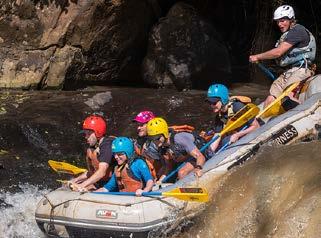
AirKenya flies to Kisumu from whence it is an hour and a half drive to Kakamega Forest. Booking as a group, Savage Wilderness will meet you in the forest, on the banks of the Yala River and take you whitewater rafting.
Kakamega forest is the last remaining tongue of the Congo Forest that once stretched across Africa. Savage Wilderness offers three-day / two-night camping trips along the river banks. There are safe, fun rafting rapids and long flat stretches to admire this incredible forest. Email info@savagewilderness.org
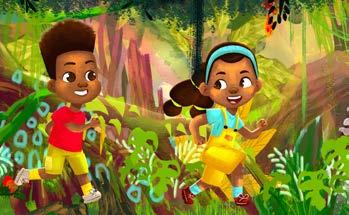

Children love songs, rhythm and dance. Uli, with her boundless curiosity and her mischievous grin loves the great outdoors and all the adventures she embarks upon to find Africa’s lost nursery rhymes. Tata, her gentle and thoughtful brother has an eye for detail and a unique perspective on their adventures with Tuki the great blue turaco from Kakamega. Tuki mentors and guides the siblings on magical musical adventures across valley and savannah, forest and lake to find the nursery rhymes that even shosho or granny will remember.
Africa’s rich musical and cultural heritage lends itself to tales that will help children across East Africa foster positive self-identity, enhance cultural & environmental literacy while at the same time promoting environmental awareness. Undocumented children’s songs, at a real risk of being lost, can be pulled back in to animate the lives of children across the continent. To date, the creators, Sarah and Chief and their team, have travelled to and documented the indigenous flora, fauna and music of regions like Lake Victoria, North Rift, Samburu, Marsabit, Lamu, Kilifi and the Eyasi Valley.
To learn more visit www.freehandmovement.com
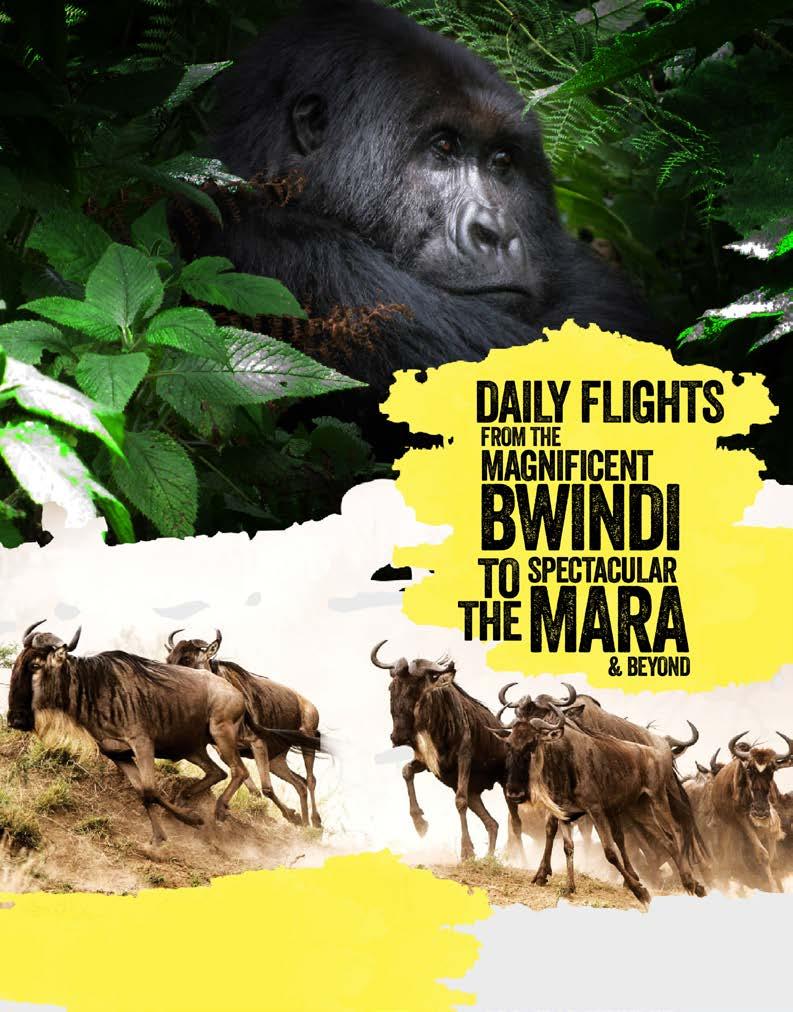
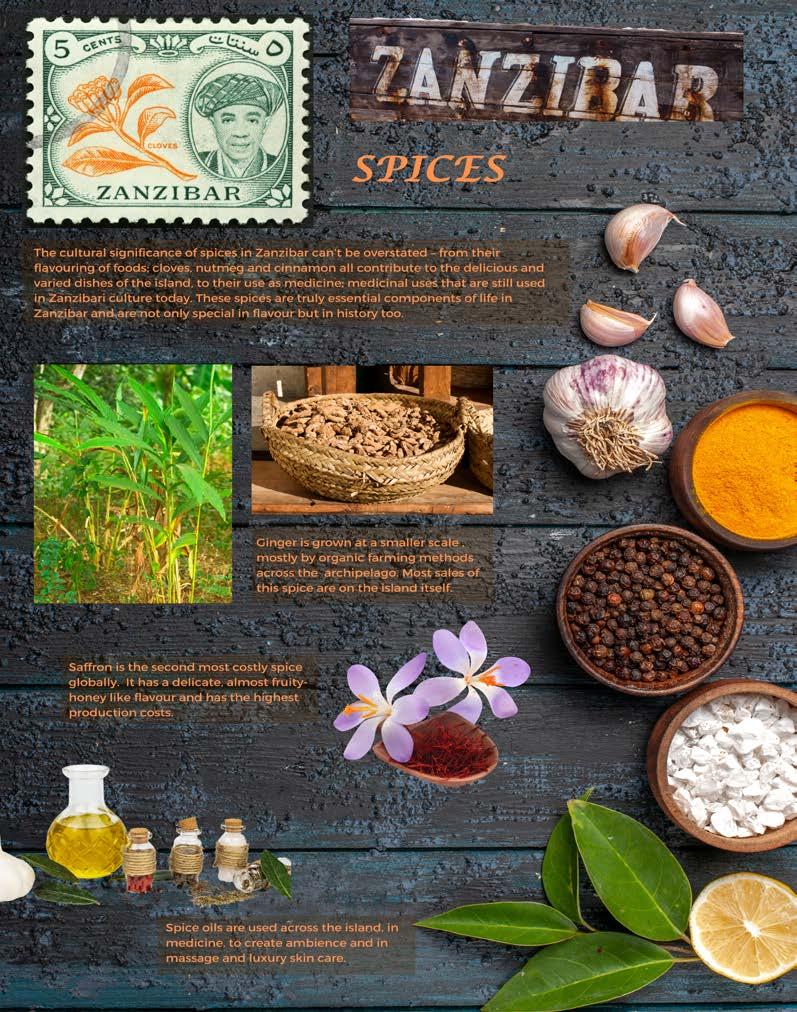
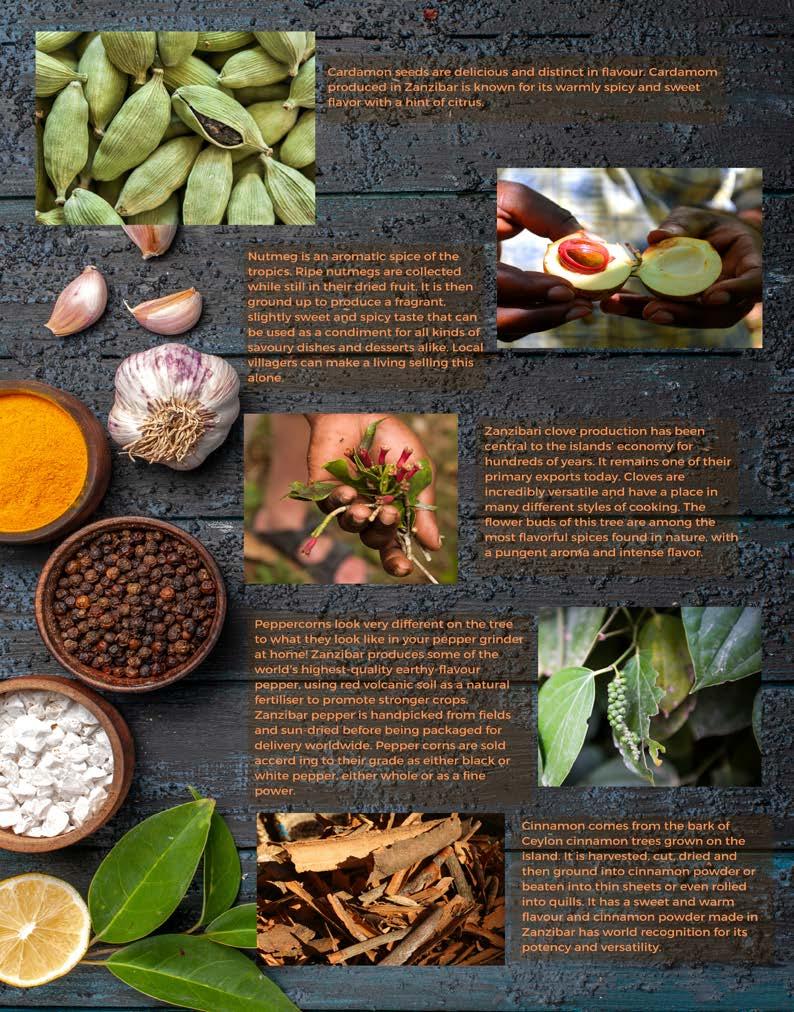
Can you share your career journey that led you to become the head of quality at Airkenya? What key experiences and learnings shaped your approach to quality management in the aviation industry?
Certainly! My career journey has been a dynamic and enriching experience. I started with aeronautical engineering, where I developed a strong foundation in problemsolving and analytical skills. I joined Airkenya and worked as an aircraft technician for over four years, gaining extensive hands-on experience in aircraft maintenance and regulatory compliance.
Continuous learning and development have been key aspects of my journey. I pursued certifications in Quality Management Systems and audit techniques, alongside other training programs related to quality management and ISO standards. These certifications expanded my knowledge and reinforced my commitment to driving excellence in all aspects of quality.
I started as a Quality Officer at Airkenya and was eventually offered the opportunity to lead the quality department. In my current role as head of quality, I am responsible for defining the strategic direction of the quality function, aligning it with business objectives and driving continuous improvement initiatives
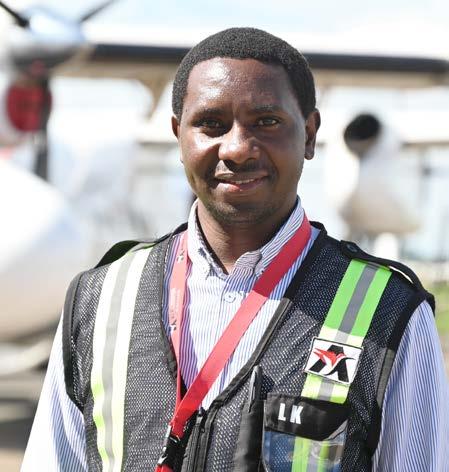
across the organisation. I hope I now exhibit a combination of technical expertise, leadership capabilities, a desire for continuous learning and a relentless pursuit of excellence in quality management.
Can you describe a moment when you were reminded of the importance of human connection in your job?
In late 2023, I had to attend an aircraft training for two weeks while simultaneously managing an Air
Operator Certificate (AOC) renewal. As I juggled my tasks there was a real need for effective communication, collaboration and support from my colleagues to successfully balance all our responsibilities as a team and the personal expectations too.
How do you think the experience of flying with Airkenya enhances the journey for travellers heading to these our unique destinations?
Airkenya prioritises regulatory compliance and the safety of its passengers. We ensure the best
training for all crew members through established international Approved Training Organizations (ATOs). Additionally, Airkenya provides seamless connectivity within Kenya, Uganda and Tanzania, enhancing the travel experience for those heading to these unparallelled destinations.
What wildlife encounter has had the most profound impact on your understanding of the need for conservation?
Encountering elephants in their natural habitat left an indelible mark on my understanding of the critical need for conservation efforts. Witnessing these majestic creatures roaming freely, displaying complex social behaviours and demonstrating remarkable intelligence was awe-inspiring. However, learning about the significant threats facing elephants, particularly from habitat loss, poaching for ivory and human-wildlife conflict, profoundly highlighted the urgency of conservation actions.
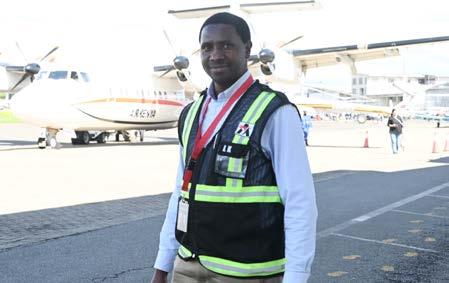
Can you describe Airkenya's approach to staff training and development for ensuring consistently high-quality in-flight service?
Airkenya heavily invests in personnel training to ensure consistently high-quality in-flight service. For example, our pilots receive simulator training from FlightSafety International in Toronto, Canada and Wichita Learning Centre. Recently, our engineers also received aircraft training from FlightSafety International. This week (May 20th to
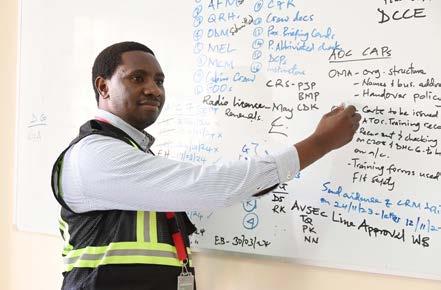
How does Airkenya maintain the quality of its aircraft interiors, including seating, entertainment systems, and overall cleanliness, to ensure a comfortable and enjoyable flight experience for passengers?
Airkenya has installed glass cockpits on all Cessna Caravan and Twin Otter fleet to ensure the best handling of the aircraft by crew during flight. All aircraft have been refurbished with new carpets and leather seats to ensure passenger comfort.
What advice would you give to aspiring quality professionals who are interested in pursuing a career in the aviation industry, particularly in a safari airline context like Airkenya?
Dedication to quality results and continuous improvement is key. Every day presents new challenges. Retaining the brand requires going the extra mile to ensure we offer the best to our clients.
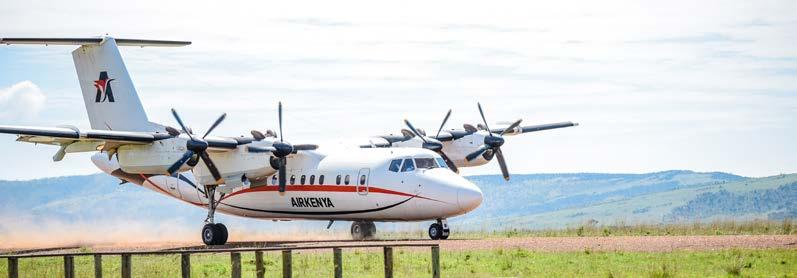
• Daily service; minimum of 2 pax to operate.
• Flight from Amboseli to Wilson connects to Nanyuki, Lewa Downs, Samburu, Meru, and Loisaba at 10:00; Maasai Mara at 10:30 and Kilimanjaro at 13:30.
•
• Daily Service; minimum of 4 pax per sector to operate.
• Kilimanjaro service is non-operational between 16th March – 15th May and 1st Nov – 20th Dec.
• This airport is your gateway to a safari between Kenya & Tanzania as it easily connects to Arusha, Manyara, Kogatende, Lobo with Regional Air Services at 15:30.
10:15 12:15
• Daily service; minimum of 2 pax to operate.
• Arrival and departure times to/from Lewa Downs may vary significantly by up to 45 minutes depending on aircraft routing over multiple airstrips.
• Flight from Lewa to Masai Mara may route via Wilson in low season to connect on the 14:00 flight.
• Flight from Lewa to Wilson connects to Kilimanjaro at 13:30 and to Masai Mara at 14:00.
• Flight from Masai Mara connects to Lewa via Wilson at 10:00.
• Call Airkenya operations on departure date to confirm arrival and pick up times for various airstrips.
• Daily Service; minimum of 2 pax to operate.
• Special offer applies to flight departing Wilson at 07:30 and from Mara at 14:45.
• The inbound flight Masai Mara to Wilson arriving at 09:45 connects to our Wilson-Northern Kenya Services ie. Lewa, Loisaba, Meru, Nanyuki and Samburu at 10:00.
• Masai Mara services op erates into multiple airstrips, therefore timings may vary depending on aircraft routing.
• The arrival and departure times depict the first stop.
• Call Airkenya operations on departure date to confirm arrival and pick up times for various airstrips.
vary significantly by up to 45
depending on aircraft routing over multiple airstrips.
• Flight from Loisaba to Masai Mara may route via Wilson in low season to connect on the 14:00
• Flight from Loisaba to Wilson connects to Kilimanjaro at 13:30 and to Masai Mara at 14:00.
• Flight from Masai Mara connects to Loisaba via Wilson at 10:00.
• Call Airkenya operations on departure date to confirm
for various airstrips.
• Daily service; minimum of 2 pax to operate.
• Arrival and departure times to/from Meru may vary significantly by up to 45 minutes depending on aircraft routing over multiple airstrips.
• Flight from Meru to Masai Mara may route via Wilson in low season to connect on the 14:00 flight.
• Flight from Meru to Wilson connects to Kilimanjaro at 13:30 and to Masai Mara at 14:00.
• Flight from Meru to Samburu is a one-direction service.
• Flight from Masai Mara connects to Meru via Wilson at 10:00.
• Call Airkenya operations on departure date to confirm arrival and pick up times for various airstrips.
NANYUKI / KAMOK
• Daily Service; minimum of 2 pax to operate.
• The inbound flight Masai Mara to Wilson arriving at 09:45 connects to our Wilson-Northern Kenya Services i.e Lewa, Loisaba, Meru, Nanyuki and Samburu at 10:00.
• Masai Mara services operates into multiple airstrips, therefore timings may vary depending on aircraft routing.
• The arrival and departure times depict the first stop.
• Call Airkenya operations on departure date to confirm arrival and pick up times for various airstrips.
• Daily service to Nanyuiki Civil and Kamok airstrips; minimum of 2 pax to operate.
• Arrival and departure times to/from Nanyuki/Kamok may vary significantly by up to 45 minutes depending on aircraft routing over multiple airstrips.
• Flight from Nanyuki Civil/Kamok to Masai Mara may route via Wilson in low season to connect on the 14:00 flight.
• Flight from Nanyuki Civil/Kamok to Wilson connects to Kilimanjaro at 13:30 and to Masai Mara at 14:00.
• Flight from Masai Mara connects to Nanyuki Civil/Kamok via Wilson at 10:00.
• Call Airkenya operations on departure date to confirm arrival and pick up times for various airstrips.
FLT NO FROM TO DEPART ARRIVE
P2 861 WILSON SAMBURU 09:00 10:00
P2 871 WILSON SAMBURU 10:00 11:00
P2 872 SAMBURU WILSON 11:15 13:25
P2 862 SAMBURU MASAI MARA 10:15 12:15
• Daily service to Samburu Kalama; minimum of 2 pax to operate.
• Arrival and departure times to/from Samburu may vary significantly by up to 45 minutes depending on aircraft routing over multiple airstripes.
• Flight from Samburu Kalama to Masai Mara may route via Wilson in low season to connect on the 14:00 flight.
• Flight from Samburu Kalama to Wilson connects to Kilimanjaro at 13:30 and to Masai Mara at 14:00.
• You can now connect to Samburu Kalama from Masai Mara via Wilson on the morning flight at 10:00.
• Call Airkenya operations on departure date to confirm arrival and pick up times for various airstrips. MIGORI /
• Daily Service; minimum of 2 pax to operate except 1st April - 31st May & 1st Nov - 20th Dec requires minimum 4 pax.
• Service operates into multiple airstrips therefore timings may vary depending on aircraft routing.
• The service connects AirKenya Masai Mara services with Regional Air /Auric Air/ Coastal Aviation Serengeti services.
12:40
P2/N8 453/432 MASAI MARA MANYARA 08:15 12:00
431/454 MANYARA MASAI MARA 08:40 12:40
P2/N8 453/422 MASAI MARA FORT IKOMA 08:15 11:20
N8/P2 421/454 FORT IKOMA MASAI MARA 09:15 12:40
P2/N8 453/422 MASAI MARA NDUTU 08:15 11:45
N8/P2 115/454 NDUTU MASAI MARA 08:00 12:40
P2/N8 453/422 MASAI MARA LOBO 08:15 11:20
N8/P2 421/454 LOBO MASAI MARA 09:15 12:40
P2/N8 453/422 MASAI MARA SERENGETI SOUTH 08:15 11:20
N8/P2 421/454 SERENGETI SOUTH MASAI MARA 09:15 12:40
P2/N8 453/422 MASAI MARA SASAKWA 08:15 11:20
N8/P2 421/454 SASAKWA MASAI MARA 09:15 12:40
P2/N8 453/422 MASAI MARA GRUMETI 08:15 11:20
N8/P2 421/454 GRUMETI MASAI MARA 09:15 12:40
• Daily Service; minimum of 2 pax to operate except 1st April - 31st May & 1st Nov - 20th Dec requires minimum 4 pax.
• Flight services route via Migori and Tarime.
• AirKenya provides road transfer and handling between Migori and Tarime.
• Service operates into multiple airstrips therefore pick up and drop off timings may vary depending on aircraft routing.
• The service connects AirKenya Masai Mara services with Regional Air /Auric Air/ Coastal Aviation Serengeti services.
MASAI MARA - UGANDA VV (VIA KISUMU/ENTEBBE)
FLT NO FROM TO DEPART ARRIVE
P2 551 MASAI MARA KISUMU 08:15 09:20
P2 552 KISUMU MASAI MARA 13:25 14:30
P2 551 MASAI MARA ENTEBBE 08:15 11:00
P2 552 ENTEBBE MASAI MARA 11:45 14:30
P2 551 KISUMU ENTEBBE 10:00 11:00
P2 552 ENTEBBE KISUMU 11:45 12:45
P2/A8* 551/121 MASAI MARA KIHIHI (BINP) 08:15 14:40
A8*/P2 112/552 KIHIHI MASAI MARA 09:45 14:30
P2/A8* 551/ 121 MASAI MARA KASESE/MWEYA (QENP) 08:15 14:15
A8*/P2 112/552 KASESE/MWEYA MASAI MARA 10:20 14:30
P2/A8* 551/131 MASAI MARA BUGUNGU 08:15 13:00 P2/A8* 551/131 MASAI MARA PAKUBA/CHOBE (MFNP) 08:15 13:00
P2/ A8* 551/ 131 MASAI MARA KIDEPO (KVNP) 08:15 14:45
P2/A8* 551/131 MASAI MARA PAKUBA/CHOBE (MFNP) 08:15 13:00
P2/ A8* 551/ 131 MASAI MARA KIDEPO (KVNP) 08:15 14:45
• This Service operates between 01st-June- 30th September.
• Mara - Entebbe - Mara Service requires a minimum of 4 pax per sector to operate.
• Entebbe - Kasese Service will require a minimum of 2 pax while Entebbe-Mweya service requires a minimum of 4 pax to operate.
• Entebbe - Kidepo Service will require a minimum of 7 pax and will operate on Wed, Fri and Sun.
• During the period that Bugungu airstrip is closed, we are using Pakuba as the designated alternative airstrip.
• Flight services route via Kisumu and Entebbe Airports for Customs and Immigration.
• Service operates into multiple airstrips therefore pick up and drop off timings may vary depending on aircraft routing.
• Maasai Mara-Entebbe flight service connects the same day to all AeroLink Airstrips except Kisoro which strictly operates in the morning. Early morning flight Kisoro-Entebbe flight service, however, connects the same day into the Masai Mara.
BINP - Bwindi Impenetrable National Park.
QENP - Queen Elizabeth National Park.
MFNP - Murchison Falls National Park.
KVNP - Kidepo Valley National Park.
• CHECK IN TIME is 60 minutes to departure time in Nairobi (Wilson), Kilimanjaro, Kisumu and Entebbe Airports. Passengers will not be allowed to check in 30 minutes to departure time on the mentioned airstrips.
• Check in time for all bush airstrips is 30 minutes before flight departure time.
• Contact Airkenya Operations department on the morning of the scheduled flight to get approximate arrival and departure times for various bush airstrips.
• Airkenya guarantees all its connecting flights within Kenya and across East Africa in conjunction with its subsidiaries; Regional Air Services and Aerolink Uganda.
• Contact the Charter department for tailor-made services or if the scheduled service does not meet your requirements: charters@airkenya.com
• AirKenya reserves the right to change departure times or carrier when so required for operational, weather or safety reasons.
Email resvns@airkenya.com or call +254 (0)20 391 6000 for further clarification.
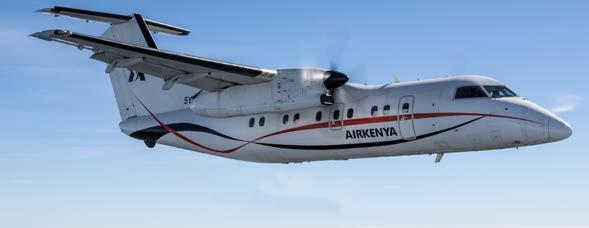
BOMBARDIER DHC 8-202 (DASH 8)
Manufacturer: Bombardier
Crew: 5 (2 pilots, 1 flight attendant, 1 engineer, 1 Baggage Master)
Passengers: Maximum 37
Description: Pressurised aircraft ideal for both African bush and city flying No in Fleet: 2

DHC 7-100 (DASH 7)
Manufacturer: Dehavilland Canada
Crew: 5 (2 Pilots, 2 Flight attendants, 1 Engineer and 1 Baggage Master)
Passengers: Maximum 49
Description: Pressurised STOL (short take-off and landing) aircraft ideal for African bush flying No in Fleet: 2

DHC 6-300 (TWIN OTTER)
Manufacturer: Dehavilland Canada
Crew: 2 pilots
Passengers: Maximum 18
Description: STOL (short take-off & landing) aircraft with fixed landing gear ideal for African bush flying No in Fleet: 3
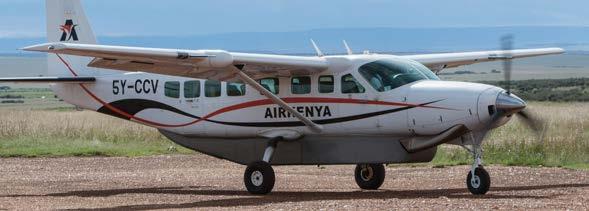
CESSNA GRAND CARAVAN C208B
Manufacturer: Cessna Aircraft Company
Crew: 2 pilots
Passengers: Maximum 11
Description: STOL Aircraft with fixed undercarriage ideal for African bush flying No in Fleet: 2
5. Lobo 6. Ndutu 7. Seronera
8. Zanzibar 9. Tarime
- Kasese and Mweya airstrips 3. Kibale Forest National Park - Kasese airstrip
-
KISUMU MALINDI DIANI LAMU 1. Amboseli 2. Kilimanjaro 3. Lewa Downs 4. Masai Mara 5. Meru 6. Nairobi
FROM
Arusha AM Kogatende 8:00 9:55
Lobo 8:00 9:25
Manyara 8:00 8:25
Manyara 9:50 10:10 Operated only July & August
Ndutu *** 8:00 9:05
Seronera 8:00 10:30
Kogatende 7:00 7:45 operated only July & August
Kogatende 9:50 11:10 Operated Only July & August
seronera 7:00 8:25 Operated Only July & August
Seronera 9:50 11:50 Operated Only July & August
Arusha PM Kilimanjaro 13:00 13:15
Manyara 16:00 16:25
Seronera 13.00 17:15
Kilimanjaro 13.15 13:30 Operated Only July & August
Arusha Zanzibar 13:00 14:35
Zanzibar 14:30 15:35 Operated Only July & August
Zanzibar Arusha 15:00 16:35
Arusha 16:00 17:05 Operated Only July & August
Kilimanjaro PM Arusha 15:30 15:45
Manyara 15:30 16:25
Seronera 15:30 17:15
Kogatende AM Arusha 10:00 12:15
Arusha 8:05 9:25 Operated only July & August
Arusha 11:30 13:35 Operated only July & August
Kilimanjaro 10:00 13:10
Kilimanjaro 11:30 13:45 Operated only July & August
Lobo 10:00 TBA
Manyara 10:00 11.35
Manyara 11:30 12:55 Operated only July & August
Ndutu *** 10:00 TBA
Seronera 10:00 10:30
Seronera 8:05 8:25 Operated only July & August
Zanzibar 10:00 14:35
Zanzibar 11:30 15:35 Operated only July & August
Tarime 9:15 10:15
Masai Mara 9:15 12:40 Connects with Airkenya at Migori
Seronera AM Arusha 11:00 12:15
Arusha 8:45 9:25 Operated only July & August
Arusha 12:20 13:35 Operated Only July & August
Kilimanjaro 11:00 13:10
Kilimanjaro 12:20 13:45 Operated only July & August
Lobo 9:30 9:50
Manyara 11:00 11:35
Manyara 12:20 12:55 Operated only July & August
Zanzibar 11:00 14:35
Zanzibar 12:20 15:35 Operated Only July & August
Tarime 9:15 10:15
Masai Mara 9:15 12:40 Connects with Airkenya at Migori
Lobo AM Arusha 9:45 12:15
Arusha 9:45 13:35 Operated Only July & August
Kilimanjaro 9:45 13:10
Kilimanjaro 9:45 13:45 Operated only July & August
Kogatende 9:45 9:55
Manyara 9:45 11:35
Ndutu *** 9:45 10:15
Seronera 9:45 10:30
Zanzibar 9:45 14:35
Zanzibar 9:45 15:35 Operated only July & August
Tarime 9:15 10:15
Masai Mara 9:15 12:40 Connects with Airkenya at Migori
Manyara AM Arusha 11:50 12:15
Arusha 13:05 13:35 Operated only July & August
Kilimanjaro 11:50 13:15
Kilimanjaro 13:05 13:45 Operated only July & August
Kogatende 8:40 9:25
Kogatende 10:30 11:10 Operated only July & August
Lobo 8:40 10:20
Ndutu *** 8:40 9:05
Seronera 8:40 10:30
Seronera 10:30 11:50 Operated only July & August
Zanzibar 11:50 14:35
Zanzibar 13:05 15:35 Operated only July & August
Ndutu AM Arusha *** 11:35 12:15
Kilimanjaro *** 11:35 13:10
Kogatende *** 9:20 10:00
Lobo *** 9:20 9:50
Manyara *** 11:35 12:00
Seronera *** 9:20 10:30
Tarime *** 9:15 10:15
Masai Mara*** 9:15 12:40 Connects with Airkenya at Migori
Zanzibar *** 11:35 14:35
Masai Mara Kogatende 8:15 TBA Connects with Regional Air at Tarime
Lobo 8:15 TBA Connects with Regional Air at Tarime
Ndutu*** 8:15 TBA Connects with Regional Air at Tarime
Seronera 8:15 TBA Connects with Regional Air at Tarime
Kilimanjaro PM Ndutu*** 15:30 17:15
Arusha PM Ndutu *** 16:00 17:15
Arusha Nairobi, Wilson 13:00 15:20
Kilimanjaro 14:25 15:20
Lobo 9:45 15:20
Kogatende 10:00 15:20
Manyara 11:50 15:20
Ndutu*** 11:35 15:20
Seronera 11:00 15:20
Kilimanjaro - Wilson Sector Operated by AirKenya Express
Nairobi, Wilson Arusha 13:15 15:45
Kilimanjaro 13:15 14:10
Manyara 13:15 16:25
Seronera 13:15 17:05
Wilson - Kilimanjaro Sector Operated by Airkenya Express
• All timings are estimates and will vary depending on aircraft routing more
• *ON REQUEST means we will only operate where there is sufficient traffic to justify the operation and timing or when extra cost is covered
• **ON INDUCEMENT means flights which we will operate at scheduled rates for 4 passengers or more
• ***SEASONAL is June to October and December to March
• ****TBA means time to be advised depending on flight plan that day
• A minimum of 2 pax is required for RAS to operate into any airstrip that’s not on inducement or request.

Manufacturer: Cessna Aircraft Company, USA
Crew: 2 pilots
Passengers: Maximum 12
Description: STOL Aircraft with fixed undercarriage ideal for African bush flying Fleet No.: 2

Manufacturer: Dehavilland, Canada
Crew: 2 pilots
Passengers: Maximum 18
Description: STOL (short take-off & landing) aircraft with fixed landing gear ideal for African bush flying No in Fleet: 1
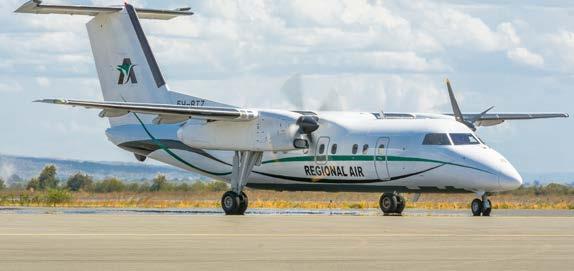
Manufacturer: Bombardier
Crew: 4 (2 pilots, 1 flight attendant and 1 engineer)
Passengers: Maximum 37
Description: Pressurized cummuter aircraft Fleet No.: 1

LAKE MBURO NATIONAL PARK
• Timings may vary depending on aircraft routing.
• Minimum of 4 passengers to operate
• Flight 117/118 operate daily except April, May and November
•
•
•
•
• From Mbarara airstrip, passengers can connect to:- Kisoro, Kihihi Mweya and Kasese airstrips on request at seat rate
MURCHISON FALLS NATIONAL PARK (PAKUBA, CHOBE AIRSTRIPS)
•
•
•
• Timings
• Flight 112 from Kihihi passengers can connect onwards to Masai Mara Via Entebbe and Kisumu for Immigration
• Flight 117/118 operate daily except April,
• From Kihihi Airstrip passengers can connect to: - Kisoro, Mweya, Kasese and Mbarara airstrips on request at seat rate.
•
• Minimum of 4 passengers to
• Flight 112 from Kasese/Mweya passengers can connect onwards to Masai Mara Via Entebbe and Kisumu for Immigration
Flight
•
• From Mweya Airstrip passengers can connect to: - Kasese, Kihihi, Kisoro and Mbarara airstrips on request at seat rate.
•
• *Routes Via Kisumu for Immigration
• Minimum of 4 passengers to operate
• From Masai Mara, passengers can connect to: Kihihi, Kasese, Mweya, Pakuba, Chobe and Kidepo.
Notes
• CHECK IN TIME is 60 minutes to departure time in Entebbe International Airport.
• Check in time for all bush airstrips is 30 minutes before flight departure time.
• Contact AeroLink Operations department on the morning of the scheduled flight to get approximate arrival and departure times for various bush airstrips.
• AeroLink guarantees all its connecting flights within Uganda and across East africa in conjunction with Airkenya Express.
• Flight to/from Jinja to Kisoro/Kihihi/Kasese/Mweya/ Murchison Falls on request at a surcharge of USD 1000
• AeroLink reserves the right to change departure times or carrier when so required for operational, weather or safety reasons.
• Contact the Charter department for tailor-made services or if the scheduled service does not meet your requirements: info@aerolinkuganda.com

CESSNA GRAND CARAVAN C208B
Manufacturer: Cessna Aircraft Company, USA
Crew: 2 pilots
Passengers: Maximum 11
Description: STOL Aircraft with fixed undercarriage ideal for African bush flying
No in Fleet: 3
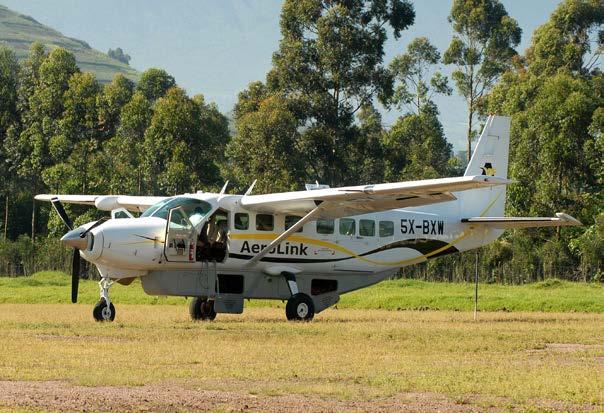
Airkenya Express Limited, Wilson Airport P.O. Box 30357 - 00100 Nairobi, Kenya
Telephone numbers:
Call Centre (Reservations) +254 (0)20 391 6000
(Operations, Sales Marketing & Accounts) +254 (0) 20 3925000, 6005745/6, +254 (0) 206005730 Mobile: +254 (0) 721 415346, 0733 731865, +254 (0) 727 131977
E-mail: resvns@airkenya.com, operations@airkenya.com charters@airkenya.com & helicopters@airkenya.com
Administration: www.airkenya.com
www.regionaltanzania.com
P.O. BOX 689 Entebbe
Tel: +256 31 7333000
Tel: +256 776 8882205
Tel: +256 31 733000
Email: info@aerolinkuganda.com www.aerolinkuganda.com



